#Who is never physically seen and only has text boxes in a few panels in like 3 issues and never appears again
Explore tagged Tumblr posts
Text
i wish there was more CRAYDL in Impulse (1995). I need more CRAYDL in my life.
#bonemeal says silly stuff#Impulse 95 is full of loveable and relatable characters and I happened to latch onto the one character#Who is never physically seen and only has text boxes in a few panels in like 3 issues and never appears again#I keep thinking about the implications#Assuming CRAYDL can’t see inside the timestream#They just saw Thad Max and later Bart go into that portal#And only Max and Bart come out#Do you think they know? That Thad CHOSE to do that? Or do you think they blame Bart and Max? Or do they blame nobody? Do they blame Thad?#They spent hundreds of years with only each other as company. How does that loss feel? How many more years will CRAYDL be alone?#I doubt that someone would go out of their way to help or move or repurpose or even kill CRAYDL after that.#They’re just an AI. There’s plenty more like them out there and those are probably better at following directions.#Do you think CRAYDL knew the other inertias? Do you think the later inertias were the same Thad as before? How do you think CRAYDL felt#Being helpless to stop inertia from being ‘killed’ again? Regardless of whether it was the same guy do you think CRAYDL was watching?#CRAYDL… I miss you… CRAYDL…#I wish I could give CRAYDL a big hug. :(#dc#impulse#inertia
10 notes
·
View notes
Note
the task force boys + alejandro and könig having a daughter who’s into STEM & physics-she’s working on a project in the basement and something goes wrong, causes a blackout
this would be the first time that has happened, only this time she ends up blacking out the entire neighborhood
『 price 』
had just sat down in front of the television, putting his feet up on the ottoman with a hefty sigh. he was exhausted, to say the least. as soon as he found a suitable channel to watch — his daughter blew a fuse.
john groaned with frustration, shouting her name just like he did every time she got herself into trouble. even if she didn't come out of the basement, he was too tired to move. the "punishment" would probably be a stern talking to... followed by a kiss on her cheek. he couldn't stay mad at her if he tried.
˗ˏˋ꒰𖦹。🧪⋆°✰꒱ ˎˊ˗
『 simon 』
hadn’t seen his daughter in hours, and was starting to worry. was she even home? did he need to go into overprotective dad mode? he checked every room; hers, his, everywhere except the basement… then the lights went out. “damn kid’s gonna be the death of me.” simon muttered to himself with a head shake, opening the door to her scientific lair.
there she was; surrounded by her work, bobbing her head to music whilst having headphones on. after a few shouts of her name, simon huffed and grabbed one of her old baby plushies out of the storage boxes—chucking it at the teen’s head. “Thought I said no more wires, before you blow up the block! … whatever it is worked, though, right? so, good job??”
˗ˏˋ꒰𖦹。🧪⋆°✰꒱ ˎˊ˗
『 soap 』
let's be honest, he was probably helping her with the project. he's a demolitions expert, so he's eager for any stem assignment she has. should his daughter know how to deal with live wires? probably not, but she's a miniature version of him, so it's inevitable.
all was going well; his answers to her questions turning into full-blown rambling and old stories. then — the power went out after she pressed the power button on the control panel. "unless you fancy sleeping outside, little one, we can't tell your ma about this, alright?"
˗ˏˋ꒰𖦹。🧪⋆°✰꒱ ˎˊ˗
『 gaz 』
his daughters biggest supporter. gaz was the one that encouraged her to sign up for the after-school STEM program when she was wee, so it’s become a passionate subject of his.
but if there was one thing he was passionate about more; staying out of trouble. his daughter was never the only one in trouble, chances are he was involved too. when the lights went out, he saw her prototypes, her notes and equations, he was amazed. “look, i’ll cover for you, luv. but no more! next time, do it at a friends house, so you can blame them.”
˗ˏˋ꒰𖦹。🧪⋆°✰꒱ ˎˊ˗
『 alejandro 』
in the middle of doing something on the computer when the lights cut off. his screen cut off whilst he was typing, and Alejandro knew instantly, who the culprit was.
probably let out a loud groan, muttering something under his breath. since he knew lecturing her to do it at a library, or literally anywhere else wouldn't do any good, he sent her a text.
his message: 😡😡😡
˗ˏˋ꒰𖦹。🧪⋆°✰꒱ ˎˊ˗
『 könig 』
the basement had become her own space. könig went all out — whiteboards, computer for studying, work tables, a daybed in case she wanted to sleep down there. anything to encourage his daughter’s hobbies.
he couldn’t be mad when she blew a fuse, just disappointed. but in a… dad kinda disappointed. disapproving, but proud of his little genius in the making. “mein kluges Mädchen, you can’t further your research if you make the world go dark, can you? be careful!”
#mw2#call of duty#task force 141#mw2 fanfic#task force 141 x reader#cod x reader#cod headcanons#141 headcanons#tf 141 x reader#141 task force#tf 141#cod mw2#mw2 x reader#mw2 headcanons#simon riley#simon riley headcanons#soap mactavish#soap headcanons#john price#captain john price#john price headcanons#kyle gaz garrick#kyle garrick#gaz headcanons#alejandro vargas#alejandro vargas headcanons#konig cod#konig#konig headcanons
434 notes
·
View notes
Text
Japanese vs. English Shigaraki - A Look At The 281 Speech
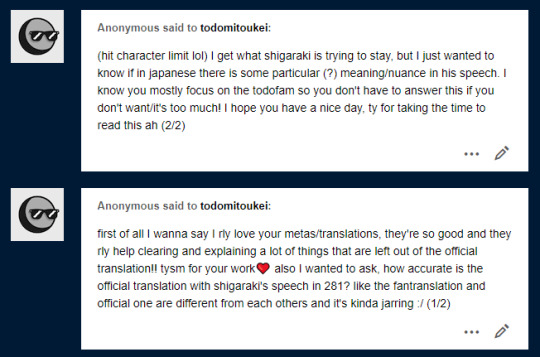
Thanks for reading!!
The speech from 281 is really interesting, especially considering that despite Shigaraki talking about heroes in general - specifically in regards to his own situation - it parallels Endeavor and the Todoroki family situation, so I’m going to talk about his speech, compare the official English translation with the Japanese version and also explain how it relates to the Todoroki family.
First things first, this speech can be treated as one long sentence. I’m breaking them all up by speech bubble/panel, but just keep in mind that these parts all string together and are building up on another (I am including the full speech at the very end of this!).
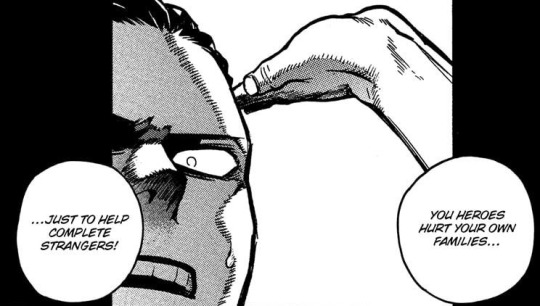
Right off the bat, Shigaraki’s speech starts with a sentence that, although about himself, is a perfect parallel to the Todoroki family.
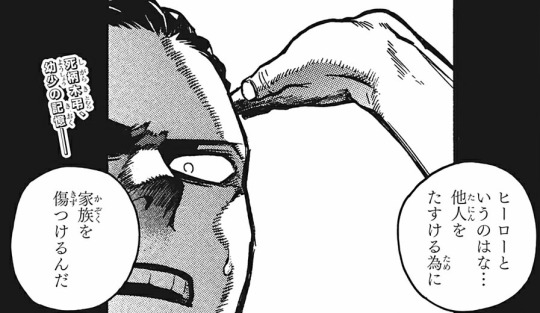
「ヒーローというのはな。。。他人をたすける為に家族を傷つけるんだ。」
「ヒーロー ; hiro ��-> hero
「というのは ; to iu nowa」-> the meaning of … is~
「な ; na 」-> ending sentence particle to express emotion or an opinion
「他人 ; tanin 」-> other people; stranger; unrelated person
「を ; o 」-> direct object marker
「たすける ; tasukeru 」-> to save
「為に tame ni 」-> for the sake of
「家族 ; kazoku 」-> family
「を ; o 」-> direct object marker
「傷つけるんだ ; kizutsukerunda 」-> injuring; hurting someone’s feelings
= “The meaning of ‘hero’ is someone who hurts their family for the sake of saving strangers.”
What’s interesting is that the panel shows Shigaraki’s dad, showing that Shigaraki recognizes that he wasn’t the only victim in his family. Instead, his whole family was hurting as a result of his grandmother, a hero, leaving to help others.
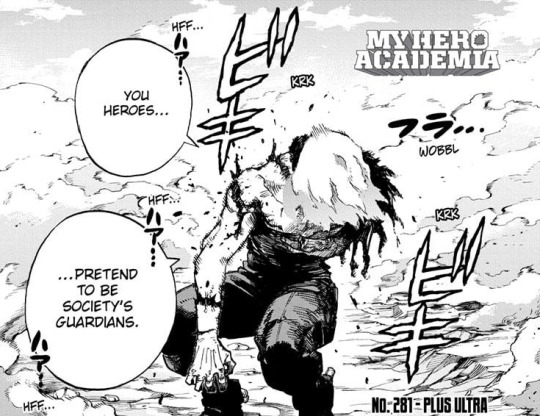
“You heroes... pretend to be society’s guardians.”

「ヒーロー(おまえたち)は社会を守るフリをしてきた。」
「ヒーロー ; hiro 」-> hero
「おまえたち ; omaetachi 」-> you (plural)
「は ; wa 」-> sentence topic marker
「社会 ; shakai 」-> society
「を ; o 」-> direct object marker
「守る ; mamoru 」-> to protect; to guard; to defend
「フリ 」-> pretending to
「を ; o 」-> direct object marker
「してきた ; shitekita 」-> to have continued to do something
= “Heroes have continued to pretend to protect society.”
As you might have noticed, the official translation says “you heroes” whereas the fan translation I read just says “heroes” - which is due to the furigana (omaetachi) that differ from the actual reading of the word (hiro). In a case like this, the furigana represent what the character says, whereas the kanji (or in this case the katakana) represent what the character actually means. The official translation always either decides to include both words or just goes for one of them. So here, Shigaraki says “you” but the katakana let us know that he is addressing this solely to all heroes, not all of society, thus showing that Shigaraki doesn’t blame all of humanity. Even though his goal originally was the destruction of everything, he has since grown to care about the League and has already promised that he wouldn’t destroy the things they care about. With that, he clearly knows not everyone is to blame - there are people out there who are in the same boat as him, who are also victims of the same corrupt society. The heroes are the ones to blame and so he is going to directly address them.
Another difference is that the official translation says “pretend to be society’s guardians” - personally, I don’t think there is much difference between using the verb (to protect/guard) or the noun (guardian) here, but the Japanese text uses the verb.
There is, however, an interesting subtle nuance in here: shitekita. Shite means to do and connects to kita (past of kuru, which means to come). This form can express a continued change in a state for something that moves toward the speaker (doesn’t have to be physical). In this specific case, it means that the pretending has been going on until now, though it’s not specified whether it will stop or continue to be. It can also imply the involvement of the speaker. Not only is Shigaraki trying to put an end to this facade, but there is no telling when exactly the pretending is going to stop.

This next panel shows Endeavor, which is all too fitting considering the text: “Fow generations... you pretended not to see those you couldn’t protect... and swept their pain under the rug. It’s tainted everything you’ve built.” Sound familiar?

「過去。。。何世代も。。。守れなかったモノを見ないフリして」
「過去 ; kako 」-> the past
「何世代も ; nan sedai mo 」-> many generations
「守れなかった ; mamorenakatta 」-> couldn’t protect (negative past potential of 守る)
「モノ ; mono 」-> used to indicate a common occurrence in the past (usually written in hiragana)
「を ; o 」-> direct object marker
「見ない ; minai 」-> can’t see
「フリ ; furi 」-> pretending to
「して ; shite 」-> did
= “In the past… many generations… have pretended to not see what they couldn’t protect.”
An interesting nuance here is the word mono. As already mentioned above, this word is usually written in hiragana, whereas here it is written in katakana, which is done to emphasize the word. The word itself when used after a verb in the past tense as is done here, indicates a common occurrence in the past, in this case, it means that the inability to protect was already very common in the past. The use of katakana emphasizes even more that this wasn’t just a few cases here and there - instead, it was almost normal.
This line can also be seen as a reference to the Todoroki family, with Endeavor having been unable to protect Touya, yet the public doesn’t know about this - nor does he acknowledge what he has done to his family and how his own actions have led to Touya’s “death”.
「傷んだ上から蓋をして」
「傷んだ ; itanda 」-> damaged
「上, ue 」-> above
「から ; kara 」-> from
「蓋 ; futa 」-> cover; lid
「を ; o 」-> direct object marker
「して ; shite 」-> did
= “Covered up the damage from above.”
The fan translation worded this as “silently swept the filth of society under the rug” similar to the official translation, which basically expresses the same notion here - that of covering up the damage, pretending that it doesn’t exist instead of acknowledging the heroes’ failures.
This is also a continuation of the previous line: Not only does he pretend not to see the one he couldn’t protect (Touya), he is also sweeping that whole situation under the rug. He doesn’t give interviews, doesn’t let the public know about how he has treated his own family and the trauma he has given them.
「浅ましくも築き上げてきた」
「浅ましく ; asamashiku 」-> shallowly; miserably (adverbial form of 浅ましい)
「も ; mo 」-> adds emphasis, criticism, or commentary of the speaker to the whole sentence
「築き上げてきた ; kizukiagetekita 」-> to have (continued to) build up
= “It was built up shallowly.”
As already mentioned above, the mo in this sentence adds emphasis to the sentence, in this case, to show just how bad everything that has been built up has become.
The kita at the end of kizukiagetekita is similar to the shitekita in the very first sentence. In this case, it means that what has been built up shallowly has continued to be built up until now and it’s also unclear whether the process ends now or will continue even after this.
Again, this sentence can be treated as a reference to Endeavor, who has been building up his career, even more so since becoming the Number One, but it’s all so shallow, being the greatest hero, despite all the ghosts in his closet and despite his whole career being built on his selfish obsessions.
The official English translation wrote this as “it’s tainted everything you’ve built” which doesn’t quite capture the nuance of the actual phrase or the fact that what has been built up has been meaningless from the start rather than it having been tainted later on.
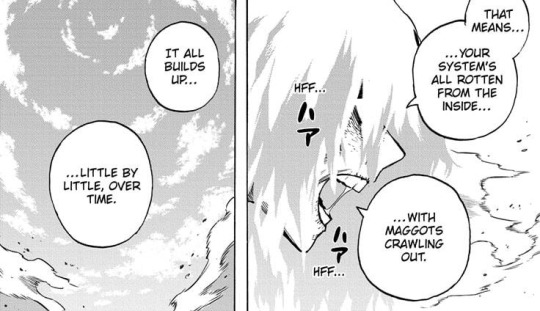
Shigaraki, in the English translation, then goes on to say “That means... your system’s all rotten from the inside... with maggots crawling out. It all builds up... little by little, over time.”
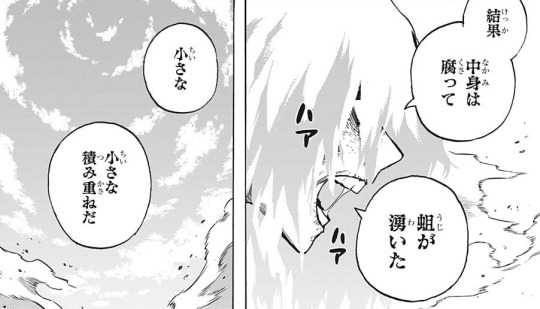
「結果中身は腐って」
「結果 ; kekka 」-> result; consequence; outcome
「中身 ; nakami 」-> contents; substance
「は ; wa 」-> topic marker
「腐って ; kusatte 」-> to rot
= ”As a result the contents are rotten.”
This refers to the whole “covering up the damage” part. Much like with food left in an opened container, the contents eventually spoil. Covering up the crimes and failings of the heroes doesn’t make those hidden secrets go away. If anything, it only makes them get worse over time, until -
「蛆が湧いた」
「蛆 ; uji 」-> maggot
「が ; ga 」-> subject marker
「湧いた ; waita 」-> hatched
= “Maggots hatched.”
Dabi rose from the ashes of Touya. Yes, I’m suggesting Shigaraki is more or less comparing Dabi to a maggot here (rude), but it’s nothing personal because he is also referring to himself; essentially him referring to all villains. People who society tried to silence and erase, but the villains are those that didn’t just become rotten as a result, but those who turned into a new person; one strong enough to stand up and fight back.
So while Endeavor had spent years not admitting to how his selfishness has led to the death of his own child and in a way pretended that never happened, the remains of Touya didn’t just stay in the box; they crawled out as a new lifeform - Dabi.
「小さな小さな積み重ねだ」
「小さな ; chiisana 」-> little
「小さな ; chiisana 」-> little
「積み重ね ; tsumikasane 」-> accumulation
「だ ; da 」-> to be
= “It’s a small… small… accumulation.”
Fun fact about this sentence: This exact phrasing first appears in chapter 236 when we get Shigaraki’s backstory in reference to his feelings, particularly his hatred, piling up over time when his family kept telling him to not cry:
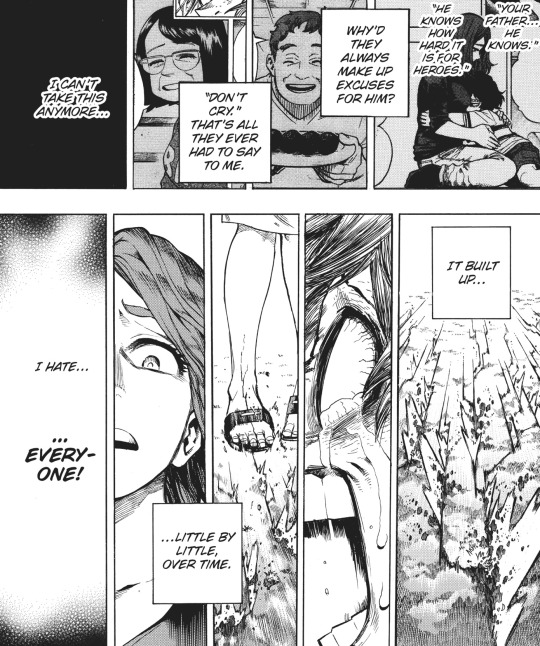
And here’s the Japanese version for comparison:
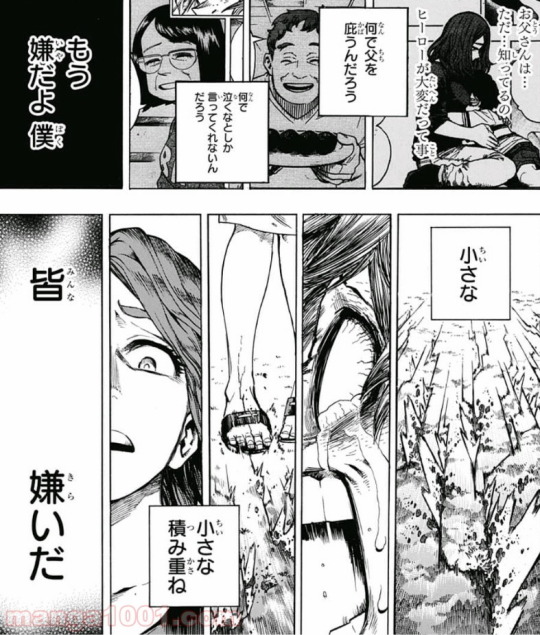
This time, it refers to all those little maggots (=villains) mentioned before, who have come together and joined forces to become the League of Villains, who then grew in numbers even more by uniting with the Meta Liberation Army to form the Paranormal Liberation Front.
Reusing that same phrasing is basically saying that history will repeat itself if nothing gets changed. But every time, the pile gets bigger and so do the results.

“You’ve got the common trash, all too dependet on being protected,” Shigaraki says next in this panel showing random civilians, aka the “common trash”.

「守られる事に慣れきったゴミ共」
「守られる ; mamorareru 」-> to be protected
「事 ; koto 」-> nominalizer (similar to adding “to” or “-ing” in English)
「に ; ni 」-> express object of verb (similar to を but used for verbs with a nuance of motion/direction)
「慣れきった ; narekitta 」-> was too used to it
「ゴミ共 ; gomidomo 」-> garbage; scumbags
= “Scumbags that are too used to being protected.”
Narekitta consists of the words 慣れる ; nareru (to grow accustomed to) and the suffix しきる ; shikiru (to do… hard; to happen to the maximum) and added together they mean that someone is too used to something.
This part emphasizes the fact that those heroic acts create a false sense of security for society, with absolutely no one questioning anything. People want to feel secure, so they don’t see the flaws around them.

“And the brave guardians who created the trash that need coddling. It’s a corrupt, vicious cycle,” he continues, now showig a panel of heroes rescuing civilians.

「そのゴミ共を生み出し庇護するマッチポンプ共」
「その ; sono 」-> that
「ゴミ共 ; gomi domo 」-> garbage; scumbags
「を ; o 」-> direct object marker
「生み出し ; umidashi 」-> to create; to bring forth
「庇護する ; higo suru 」-> to protect
「マッチポンプ共 ; macchipanpu domo 」-> match pump; stirring up trouble to get credit from the solution
= “A match pump that creates and protects those scumbags.”
The words for garbage and match pump in Japanese both end with domo, which is a pluralizer. This shows that Shigaraki is making it clear that this is not just a single exception, but something that happens numerous times.
Match Pump is an interesting and fitting term to use, as it refers to someone causing a problem to occur, ensuring no one knows who the actual culprit is, and then solve the problem they caused to appear as the savior. The words themselves refer to an example of this, where someone sets something on fire with a match and then pretends to just arrive at the scene and pump water onto it, thus appearing as the hero that put out the fire, despite them being the one to start it.
In the case of the hero system as a whole, it’s because the heroes are the reason the citizens need them. Because some heroes cause the existence of villains, protect citizens from those villains and get thanked as a result. But citizens wouldn’t even need all that protection if it weren’t for the heroes that create the villains in the first place.
In other words, a pretty obvious parallel to the Todoroki family. Endeavor, being the one to have trained and then abandoned Touya. Touya then dying in a fire which - although not directly caused by Endeavor - represents Endeavor, a father who allowed that situation to happen. Touya died and became the villain, Dabi, which in turn gives Endeavor work and opportunities to present himself as a hero to society by taking down villains. The most notable example of this is his first proper debut as Number One, as he defeated the Nomu sent by Dabi. But that Nomu wouldn’t have been sent by Dabi if Endeavor hadn’t created Dabi, to begin with. Society can’t help but appreciate his work as a hero, despite not knowing that villains like Dabi wouldn’t exist if it weren’t for people like Endeavor.
The official English translation added the phrase “it’s a corrupt, vicious cycle” which doesn’t appear in the original Japanese text, but it is actually a pretty fitting statement.

“Everything I’ve wittnessed... this whole system you’ve built has always rejected me,” Shigaraki says in the official translation, which isn’t necessarily wrong, but the word “rejected” isn’t exactly what he says, nor does it capture the point he actually makes.

「これまで目にした全ておまえたちの築いてきた全てに否定されてきた」
「これまで ; koremade 」-> so far
「目にした ; me ni shita 」-> saw; witnessed
「全て ; subete 」-> everything
「おまえたち 」-> you (plural)
「の ; no 」-> particle to indicate possession, works like an apostrophe
「築いてきた ; kizuitekita 」-> have been building
「全て ; subete 」-> everything
「に ; ni 」-> by
「否定されてきた ; hitei saretekita 」-> has been denied
= “So far, everything I’ve witnessed has been denied by everything you’ve built.”
The kita at the end of hitei saretekita is, much like the prior sentences, showing us that this denying has been continuing up until now.
That whole hero facade and the heroes pretending their failures don’t exist by sweeping everything under the rug is the reason why people don’t see the League as victims. Little Tenko wasn’t helped and has become a villain as a result of that, but heroes don’t admit this. They don’t care about what Shigaraki has to say; they refuse to see the dark sides that he has seen and then label him as the bad guy instead of recognizing that their system is flawed. This is also why the English translation isn’t really that great here. It’s not just about him being rejected, it’s about the fact that his truth is being denied. The system doesn’t just turn him away at the door, it doesn’t acknowledge his existence, to begin with. An existence that is filled with injustice and pain.

“Now I’m ready to reject it. That’s why I destroy. That’s why I took this power for myself. Simple enough, yeah?”

「だからこちらも否定するだから壊すだから力を手に入れるシンプルだろ?」
「だから ; dakara 」-> so
「こちら ; kochira 」-> this
「も ; mo 」-> also
「否定する ; hitei suru 」-> to deny
「だから ; dakara 」-> so
「壊す ; kowasu 」-> to break; to destroy
「だから ; dakara 」-> so
「力 ; chikara 」-> strength; energy
「を ; o 」-> direct object marker
「手に入れる ; teniireru 」-> to obtain; to procure
「シンプル ; shinpuru 」-> simple
「だろ ; daro 」-> I think; don’t you agree?
= “So I also deny this, so I break it, so I obtain strength. Simple, don’t you agree?”
Heroes have denied the pasts and pain of the villains, so now the villains refuse to accept this society. They deny this system the same way it has denied them all this time, too. And although Shigaraki is referring to himself, you can also exchange the “I” for “we” to refer to the other villains like him:
We deny this - The villains oppose the current hero system.
So we destroy - When all else failed and no one would ever listen, their last option is to break everything so they have to make a change.
So we obtain power - By showing people the truth, the villains obtain power instead. They get their voices back and get to live again.
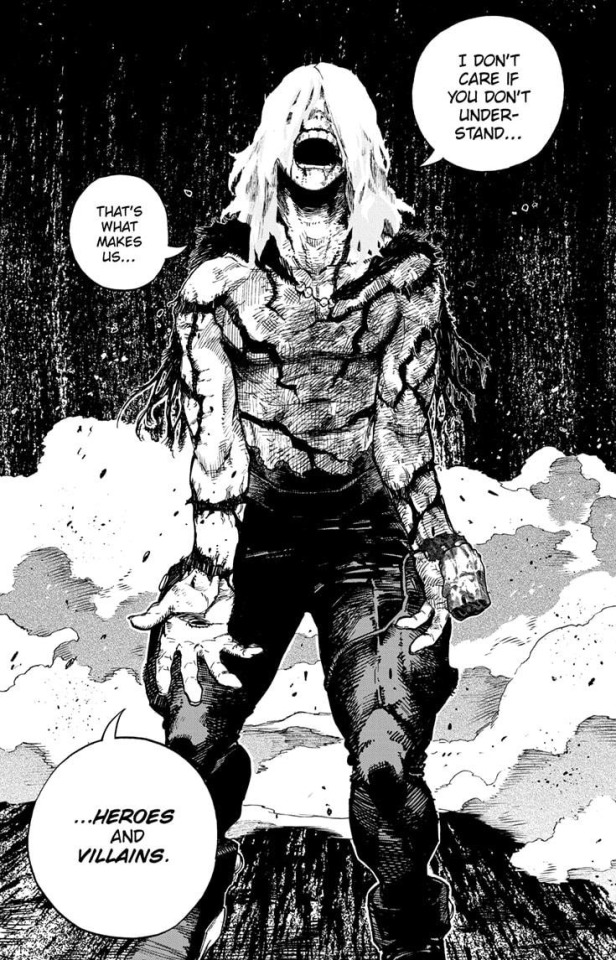
“I don’t care if you don’t understand... that’s what makes us... heroes and villains,” is the end to Shigaraki’s speech and yet this is where a big change is made.
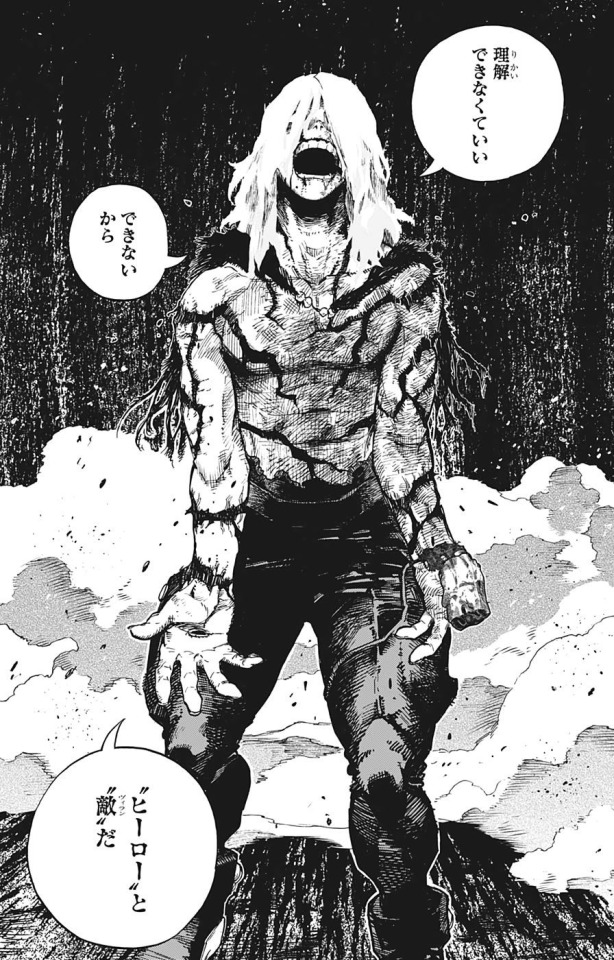
「理解できなくていいできないからヒーローと敵(ヴィラン)だ。」
「理解 ; rikai 」-> sympathy; comprehension
「できなくていい ; dekinakute ii 」-> don’t have to be able to; it’s okay to not be able to
「できない ; dekinai 」-> unable to
「から ; kara 」-> because
「ヒーロー ; hiiro 」-> hero
「と ; to 」-> and
「敵 ; viran 」-> villain
「だ ; da 」-> to be
= “You don’t have to be able to understand. Because you are unable to, there are ‘heroes’ and ‘villains’.”
This is a very interesting statement and one that is entirely accurate. Shigaraki says it’s okay that the heroes are unable to understand the truth. After all, his goal is not to educate them, but to destroy the hero system. But it’s because of their lack of understanding that there are heroes and villains. If people like Endeavor didn’t exist, then villains like Dabi wouldn’t exist, either. If people knew and understood the truth about Endeavor’s past, then he wouldn’t be a hero. What is the difference between someone like Endeavor and any other criminal? The divide doesn’t make sense when the sides are so blended together.
Overall, this speech is Shigaraki addressing the heroes to call them out for this ongoing facade they put up, pretending not to see the truth, not to see the victims that aren’t good enough. And despite the fact this speech addresses heroes as a whole, it perfectly describes the whole Endeavor/Todoroki family situation, too. And what’s interesting is that during all of this, the heroes prove the accuracy of this speech by ignoring it completely. Particularly Endeavor, who should feel called out here, who just thanks Shigaraki for the monologue so he could regain some of his energy.
Endeavor himself needed to see what Shigaraki was talking about since he first shows an actual reaction once Dabi revealed himself to be Touya. Shigaraki hit the nail on the head, yet Endeavor chose to not listen and instead continued to pretend not to see, but Dabi doesn’t let him continue to pretend.
In a way, it’s fair to say that a continuous theme of this story is the whole “actions speak louder than words” - Shigaraki could write a whole book talking about the problems with hero society, yet Dabi had to show up and reveal to Endeavor that he’s Touya; that the first-born failure of a son that got tossed aside when he was of no use anymore didn’t just die for no one to find out what really happened.
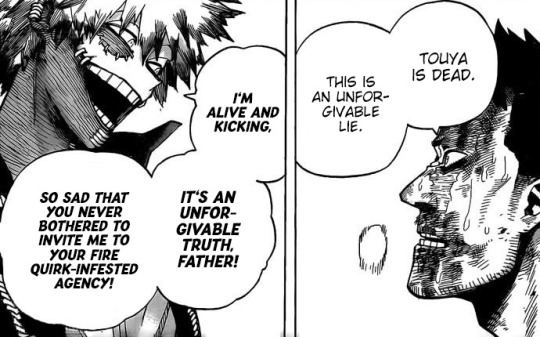
All these months of Endeavor regretting the past, yet not changing anything, not even acknowledging his wrongdoings; so now his own past came back. Because throwing Touya aside wasn’t the end. From the remains of Touya came a new lifeform - Dabi, who only exists as a villain because of Endeavor.
And with Dabi’s existence and Shigaraki’s existence, they can destroy the system that denied the pain of Touya and Tenko.
It’s such a good speech that perfectly captures the problem of the hero society, yet both heroes and some fans ignore it. Still, ignoring isn’t enough because now it’s time for the villains to strike back and put an end to a system that creates victims, labels them as villains, and then pats itself on the back for putting them in prison instead of admitting who the real culprit is and instead of helping the victims back on their feet.
As I mentioned at the start, the entire speech is essentially one long sentence, so here’s the full text both in Japanese and English:
「ヒーローというのはな。。。他人をたすける為に家族を傷つけるんだ。ヒーロー(おまえたち)は社会を守るフリをしてきた。過去。。。何世代も。。。守れなかったモノを見ないフリして傷んだ上から蓋をして浅ましくも築き上げてきた結果中身は腐って蛆が湧いた小さな小さな積み重ねだ守られる事に慣れきったゴミ共そのゴミ共を生み出し庇護するマッチポンプ共これまで目にした全ておまえたちの築いてきた全てに否定されてきただからこちらも否定するだから壊すだから力を手に入れるシンプルだろ?理解できなくていいできないからヒーローと敵(ヴィラン)だ。」
“The meaning of ‘hero’ is someone who hurts their family for the sake of saving strangers. You heroes have pretended to protect society. In the past… for many generations… you have pretended to not see what you couldn’t protect. You covered up the damage, shallowly built it up. As a result, the contents are rotten and maggots hatched from it. A small, small accumulation. Garbage, too used to being protected. A match pump that has created and protected that trash. Everything I’ve witnessed so far has been denied by what you’ve built. And so I deny this. And so I destroy this and get power from it. Simple, isn’t it? It’s okay if you can’t understand. It’s because you don’t understand that there are ‘heroes’ and ‘villains’.”
#shigaraki#bnha#todoroki#dabi#281#boku no hero academia#translation#meta#my hero academia#mha#tomura#touya#lov#league of villains#japanese
202 notes
·
View notes
Text
Bisexual Kyoshi is something that can be so personal, actually
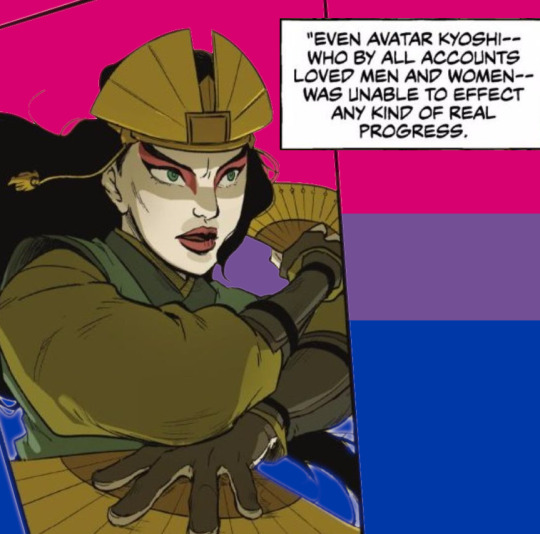
Panel edit by @flagellasturbation
[image I.D. : An edit of a comic panel of avatar Kyoshi. On the left in the image is a close-up of Kyoshi from the torso up, contained within an upside-down trapezoid shape. She wears her full battle uniform of olive and emerald robes, dark gloves and bracers, and a golden headpiece in a fan-like shape. Her eyes are the same emerald shade as her robes, she has black hair billowing to the left edge of the image, and her black eyebrows have been dramatically lengthened by black face paint. Her face and neck are artificially whitened with chalky makeup, she has black winged eyeliner, red eyeshadow that sweeps upwards to her temples and down the sides of her nose, and red lipstick outlined in black. This is the classic Kyoshi makeup. Her arms are crossed, the left arm behind her head pointing a golden fan away from the viewer, the right arm extended in front of her face, another golden fan pointed towards the viewer. She appears to be looking upwards and towards the right of the image. Above Kyoshi’s eye level and in the top right of the image is a comic text box. It reads in all caps: “even avatar Kyoshi- who by all accounts loved men and women- was unable to effect any kind of real progress.” The background art and color has been replaced with the Bisexual Flag, a thick horizontal line of pink on top, stopping at Kyoshi’s cheek level, then a thinner line of purple ending at her shoulders, and a thick line of blue that extends to the bottom of the image. End I.D.]
(If someone does not find my image I.D. sufficient, please let me know. This is my first time trying to make such a thing, as i am a lurker, not a poster)
Rise of Kyoshi by F.C. Yee, page 99 (text copy / pasted from the b&n ebook version)
““Are those . . . fire lilies?” he said, a wide, knowing grin spreading across his face.
Kyoshi flushed beet red. “Stop it,” she said.
“That’s right,” Yun said. “The Ember Island tourism minister brought a bunch when he visited two weeks ago. I can’t believe you simply shred the flowers once they dry out. I guess nothing goes to waste in this house.”
“Knock it off,” Kyoshi snapped. But it was too hard keeping the corners of her lips from curling upward.
“Knock what off?” he said, enjoying her reaction. “I’m just commenting on a fragrance I’ve come to particularly enjoy.”
It was an inside reference that only the two of them shared. Rangi didn’t know. She hadn’t been there in the gifting room eight months ago while Kyoshi arranged a vast quantity of fire lilies sent by an admiral in the Fire Navy, one of Hei-Ran’s friends.
Yun had spent the afternoon watching Kyoshi work. Against every scrap of her better judgment, she’d allowed him to lie down on the floor and rest his head in her lap while she plucked deformed leaves and trimmed stems to the right length. Had anyone caught the two of them like that, there would have been a scandal that not even the Avatar could have recovered from.
That day, entranced by Yun’s upside-down features dappled with the flower petals she’d teasingly sprinkled over his face, she’d almost leaned down and kissed him. And he knew it. Because he’d almost reached up and kissed her.
They never spoke of it afterward, the shared impulse that had nearly crashed both of their carriages. It was too . . . well, they each had their duties was a good way to put it. That moment did not fit anywhere among their responsibilities.
But since then, whenever the two of them were in the presence of fire lilies, Yun’s eyes would dart toward the flowers repeatedly until he was sure Kyoshi noticed. She would try unsuccessfully to keep a straight face, the heat coloring her neck, and he’d sigh as if to mourn what could have been.
Today was no different. With a wistful blush on his own cheeks, Yun stared her down until her defenses broke and she let out a giggle through her nose.
“There’s that beautiful smile,” he said. He pressed his heels into the floor, sliding up against the wall, and straightened his rumpled shirt. “Kyoshi, trust me when I say this: If it turns out not to be me, I’ll be glad it’s you.”
~~~~~~~~~
Rise of Kyoshi by F.C. Yee, page 210 (text copy / pasted from the b&n ebook version)
“You think you don’t deserve peace and happiness and good things, but you do!” Rangi yelled. “You, Kyoshi! Not the Avatar, but you!”
She closed the distance and wrapped her arms around Kyoshi’s waist. The embrace was a clever way to hide her face.
“Do you have any idea how painful it’s been for me to follow you on this journey where you’re so determined to punish yourself?” she said. “Watching you treat yourself like an empty vessel for revenge, when I’ve known you since you were a servant girl who couldn’t bend a pebble? The Avatar can be reborn. But you can’t, Kyoshi. I don’t want to give you up to the next generation. I couldn’t bear to lose you.”
Kyoshi realized she’d had it all wrong. Rangi was a true believer. But her greatest faith had been for her friends, not her assignment. She pulled Rangi in closer. She thought she heard a slight, contented sigh come from the other girl.
“I wish I could give you your due,” Rangi muttered after some time had passed. “The wisest teachers. Armies to defend you. A palace to live in.”
Kyoshi raised an eyebrow. “The Avatar gets a palace?”
“No, but you deserve one.”
“I don’t need it,” Kyoshi said. She smiled into Rangi’s hair, the soft strands caressing her lips. “And I don’t need an army. I have you.”
Psh,” Rangi scoffed. “A lot of good I’ve been so far. If I were better at my job you would never feel scared. Only loved. Adored by all.”
Kyoshi gently nudged Rangi’s chin upward. She could no more prevent herself from doing this than she could keep from breathing, living, fearing.
“I do feel loved,” she declared.
Rangi’s beautiful face shone in reflection. Kyoshi leaned in and kissed her.
A warm glow mapped Kyoshi’s veins. Eternity distilled in a single brush of skin. She thought she would never be more alive than now.
And then—
The shock of hands pushing her away. Kyoshi snapped out of her trance, aghast.
Rangi had flinched at the contact. Repelled her. Viscerally, reflexively.
Oh no. Oh no.
This couldn’t—not after everything they’d been through—this couldn’t be how it—
Kyoshi shut her eyes until they hurt. She wanted to shrink until she vanished within the cracks of the earth. She wanted to become dust and blow away in the wind.
But the sound of laughter pulled her back. Rangi was coughing, drowning herself with her own tears and mirth. She caught her breath and retook Kyoshi by the hips, turning to the side, offering up the smooth, unblemished skin of her throat.
“That side of my face is busted up, stupid,” she whispered in the darkness. “Kiss me where I’m not hurt.”
~~~~~
I include both these quotes because i've seen a few posts about the “gigantic lesbian” avatar, and although i am glad my sapphic sisters feel connected to Kyoshi (as well they should!), that doesn't mean i wish to simply be quiet on the matter of her textual bisexuality. I understand that not everyone has read her novels, nor has everyone read legend of Korra comics, but Kyoshi is *textually* bisexual.
Kyoshi had a loving romantic relationship with her firebending friend Rangi, but this does not erase her feelings for her earthbending friend Yun, even if neither of them were able to properly express it due to their respective “status”. (For context if you haven’t read, the masters believed that Yun was the avatar, and though he was bodyguarded by Rangi, and though Kyoshi was his servent, the three of them were simiar ages and thus close friends until the discovery of Kyoshi’s true ability destroyed their former lives). Hell, Kyoshi and Rangi do not become intimate until after fleeing their former lives. Who is to say what would have happened, had Yun not been captured by father glowworm ?
I know that there is a chance you will scoff at this, will write this off as comphet, accuse me of disproportionately weighting an almost-kiss with a true relationship, but these above quotes (as well as the comic panel from “the legend of korra: turf wars- part 1”) serve as proof that Kyoshi, “by all accounts loved men and women” (see panel directly below)
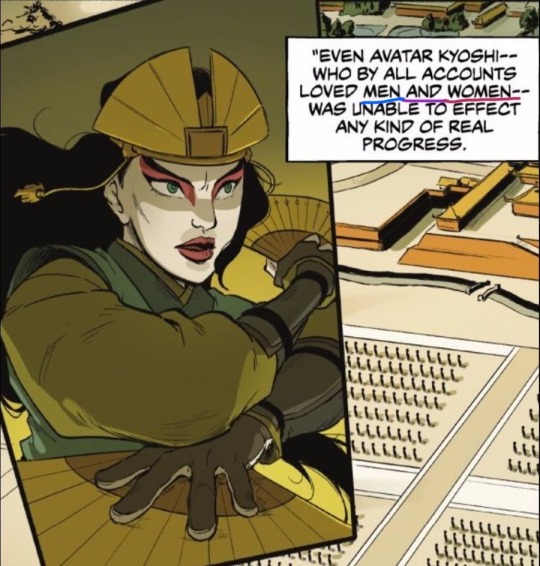
[image I.D. : the same comic panel as the edit above, this one without the bisexual flag edited in. Directly behind Kyoshi, within the upside-down trapezoid shape, is an olive to lime gradient, darker around her head and lighter near the bottom. Around and to the right in the image, outside of the trapezoid, is an aerial shot of buildings within an Earth Kingdom city, and what appears to be the lines of troops on the ground far below. the text box in the image is the same, but I have underlined the word “men” in blue, the word “and” in purple, and the word “women” in pink, to reflect the bisexual flag. End I.D.]
I am making such a big deal over this because Kyoshi is a massive figure, her long shadow cast over Aang’s life alongside Roku’s, and even before her novels came out there were often jokes about her “bloodthirsty” nature. I implore you to read the novels and see why Kyoshi believed in deadly justice at times, but also so you can see what a dynamic, loving, and beautiful character she is.
Some members of fandom have taken a “step on me” attitude towards Kyoshi, who has, even if the 7 feet tall thing is more fanon than canon, been explicitly described as “exceptionally tall”, and “towering” over others. This “strong woman who will break me and I thank them” attitude is one that butch &/or physically imposing sapphics, as well as trans women with similar statures to Kyoshi have expressed discomfort when applied to themselves and characters like them. I would love for more people to acknowledge her flaws and multi-faceted nature, that she is more than a “warrior goddess”, just as Aang is more than a living relic. Flattening her out to the easily-fetishable parts erases the depth of her character and the complexity of circumstances that led to the instances of deadly force.
There are very few bisexual characters in media, especially women, and especially in children’s media. Bisexual women have often been caricatured as loose, promiscuous, good for a threesome and not much else. (This is mot to say that i think any lesser of my fellow bisexuals who are proudly promiscious, nor can an actual live bisexual person be considered a stereotype for living their life, but media’s portayal of us as obsessed with desire is incredibly harmful). Knowing that a strong, beautiful, and important character in the avatar universe is a bisexual woman is amazing, even more so to have her first lady-love described in the novels with such care. F. C. Yee, the author of these novels, has my eternal gratitude. I sincerely hope that the new generation of fans, whether they are drawn to the cartoon or even the hypothetical live action show, will pick up these novels and discover the kind of bisexual character that I wish existed in my early days as a reader, and if a small fraction of them resonate with Kyoshi’s reciprocal on Yun and love for Rangi, then the world becomes a little bit brighter for it.
I mentioned her importance for the simple reason that Kyoshi IS important with the text of ATLA. As one of the avatars, she is one of the most historically important figures in that universe, one of the few avatars that Aang knows by name, and one of the only avatars to speak through his body. The fact that she has two whole novels to herself testifies to that effect, making her bisexual representation all the more important than a simple background character might be.
If or when the ATLA live action tv show occurs, we can expect some mention of Kyoshi. After all, there is a whole episode dedicated to exploring one of her missions, and the way that the descendants of her enemy have recolored history. It is my sincere desire that enough discussion is made about her canon bisexuality , that fandom trumphets it from the roof with as much force as crackshipping zukka, that when she does make it to the screen, there is some subtle nod in her bisexuality’s direction, even if it is something as meta as casting a bisexual actress for her. Thank you for taking the time to read this.
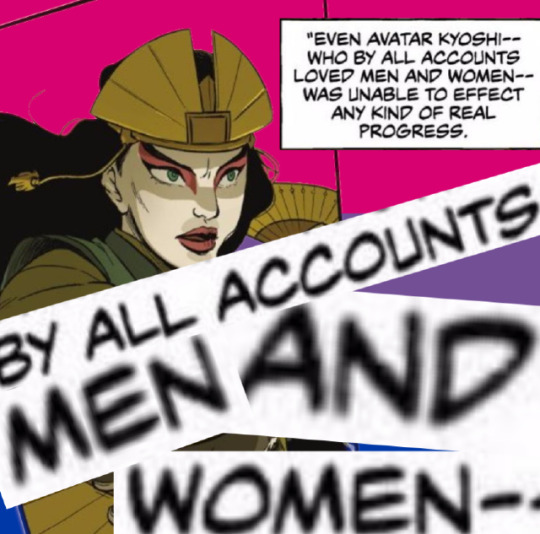
edit by @flagellasturbation
[image I.D. : An edit of a comic panel of avatar Kyoshi. This is like the first image, Kyoshi and the text box of the comic panel untouched, the background color and art replaced with the bisexual flag. However, this version has the words “by all accounts” blown up large and placed diagonally in the image, directly under Kyoshi’s face and stretching from one side of the image to the other. The bottom third of the image is similarly obscured, the words “men” , “and” , “women” blown up large enough to fill the panel and cover most of Kyoshi’s torso, as well as the purple and blue areas of the background flag. End I.D.]
98 notes
·
View notes
Text
WIBAR Intermission: Cultural Differences
a commission for @secretlypansexualmango !! thank you so much for your patience with me during this difficult time, I hope you enjoy reading as much as i did writing it! :)
if you’re new to this AU, you can find the first story on tumblr here and the ao3 collection here!
warnings: anxiety, tense discussion, mention of nonconsensual drug use, medical experimentation, mention of child abuse, dehumanizing language, flashbacks, PTSD
-
Logan paced back and forth along his floor, hands strumming the air but not noting any particular information, just… moving. A nervous tic that he’d recently been struggling to repress around Virgil.
Speaking of.
“Patton, you are certain that Virgil will not wonder where you are and come to investigate?” he asked, turning on the balls of his feet to face the little Ampen.
“Yep, I showed him how to use the tech in the washroom and he said something about staying in there all day. Turns out Humans need water to clean, not dirt!” Patton tapped his fingers together consideringly. “Now I feel kind of bad about trying to get him to dust more often, no wonder he’s all grimy.”
Logan forced his hands to still so he wouldn’t record the information. That was the whole reason they were here, after all.
“Why are you so worried about the Human finding us huddling in your bedspace like a bunch of giggling adolescents?” Roman asked, adjusting his armor plates slightly so they didn’t pinch. He perked up for a moment. “Are we finally kicking him out?”
Patton frowned in disapproval at him, and he averted his eyes. “Joking! Just joking, Pat.”
Logan hummed lightly to recall their attention. “I am seeking advice in regards to the Human— or, Virgil, rather, but I don’t want to offend him or give him the wrong idea by openly excluding him from a conversation. Hence, covert gathering.”
Patton brightened— literally, his feathers aglow with excitement. “Oh, why didn’t you say so, Lo!”
Roman sunk further down, a grumble forming in his chest. “Yeah, why didn’t you say so. I don’t think I’ve got much to contribute about him compared to Patton.”
Logan inclined his head slightly in a Crav’n gesture to hold on for a little longer. “While I will admit that you have very different opinions on Virgil, I value both your perspectives equally and as such, would like to hear your honest thoughts on my query.”
Roman didn’t shift, but the grumble eased slightly, placated by Logan’s words. “Alright, what is it?”
Patton nodded encouragingly.“I’m all ears, kiddo! Feathears, that is!”
Logan didn’t dignify the atrocious pun with a response beyond his face pinching slightly. “I’m sure you all remember the incident we had recently, with the... yawning.”
At the reminder, Patton winced and Roman glowered.
Virgil had joined them for breakfast again the prior light cycle, a rare occurrence, and had nearly startled Logan out of his seat when he had stretched his jaw unnaturally wide with a crack, apropos of nothing. Patton had hurried to reassure them it was normal, and very much harmless, but it hadn’t prevented Roman from looking visibly on edge for the rest of the morning. Virgil had fled to his room early as a result.
“I believe that it would be beneficial for all of us to learn more about Human culture, and while I have scoured many texts for information, most of it has proven to be inaccurate or downright offensive. As a result, I’ve decided that I should attempt to ask Virgil directly to share,” Logan nervously fluttered his hands. “Ideally through a Vidi.”
Patton, who had gotten all fluffed up during his explanation, now paused slightly. “I think it’s a great idea for you to bond with Virgil, Lo! I’m not sure he’d be too keen on sharing minds, though. The idea seemed to make him nervous.”
Roman snorted.
“Yes, I predicted as much.” Logan gestured between the two of them. “Hence why I have gathered you to receive insight on how best to go about gaining his permission.”
His two closest friends shared a look, Patton having to crane his neck up considerably to do so. The Ampen piped up first.
“I say you should just ask him! What’s the worst that could happen?”
Beside him, Roman made a gesture to ward off bad luck, muttering about inviting chaos. Logan held a hand to his face to ward off any headaches.
“He could say no,” he emphasized, pointing out the obvious flaw.
“That is not the worst that could happen. And anyways, if he says no, it’s not the end of the universe. You can still make a valiant effort to convince him after the fact. Write a 20 page dissertation on all the reasons he should give it a shot, or bargain with jam, or any other nerd stuff. But if you try to go behind his back--”
“He’ll never trust you again,” Patton completed, antennae lowering at the thought. “Virgil is slow to trust, and for good reason. I know you of all people can understand that, Logan.”
“Actually, I was going to finish that with ‘you might never get a second chance to Vidi with anyone, because you’ll be dead.’ Humans don’t take lightly to intrusion,” Roman clenched his hands, gaze dark.
Patton drooped more, like he was attempting to become a puddle of sad Ampen. “I know you two aren’t as familiar with Virgil as I am, but… I’m telling you, he doesn’t want to hurt anyone. He’s probably even more scared of you than you are of him.”
“I am not scared of a Human,” Roman insisted, scales rattling in offense. “And anyhow, we aren’t talking about a little fuzzy pollinator from a flora planet, we’re talking about a Human. A deathworlder. I know he was merciful to you, Pat, and I’m glad, but that doesn’t mean we can trust him to go against his nature. The way he acts, the look in his eye… I’ve seen it before. So you’ll have to forgive me if I don’t believe for a second that he’s harmless.”
“Roman--!” Patton stopped short as the Crav’on rose to his feet and stormed out in a huff, dramatic as always. The small alien let out a frustrated trill, tugging on his antennae for a second before turning back to Logan.
“I never said that he was harmless,” he announced pointedly. “None of us are harmless, not even me. But just because he’s got the… the potential to be dangerous doesn’t mean we shouldn’t give him a chance. Try asking him about the Vidi, Lo, and if that doesn’t work out I’ll help you think of more options, okay?”
Frankly, Logan had been hoping for something more along the lines of a guide he could follow while striking a deal with Virgil, but he nodded anyhow. Sometimes researchers simply had to work with what little they had.
-
He spent the next few light cycles calculating the encounter, from his words to all the possible outcomes. He had plenty of time to consider such things, seeing as Virgil was particularly adept at avoiding him.
Though the Human was subtle about it, it was hard to miss the way he found an excuse to leave any room Logan was in more often than not. Even when he couldn’t make a hasty escape-- most often because Patton was sleeping on his person-- he was always following Logan’s movements from the corner of his vision. Tracking him. It was… nerve-wracking.
Logan was much more than a creature of instinct, though, and so he persisted despite the occasional shiver sent down his spine.
When he finally managed to get the Human alone, however, it happened completely unintentionally. He was fixing a middark snack before sleep, and had just put the jam back in the coolant box when a vague emotional pulse nearby made his skin prickle.
He paused. Neither of his shipmates would be so quiet while nearby, so… He squinted into the dim hallways, searching for movement. “Virgil?”
“Uh,” said the Human, from on top of the cabinets how had he even gotten up there— “Hey.”
Logan was suddenly thankful for his dulled physical response, since it prevented him from doing something embarrassing like jumping out of his carapace. “Hello. Might I inquire— May I ask why you are all the way up there?”
The vague shadow that was Virgil shifted slightly, before dropping to the floor with a muted thump that shook the ground. Logan hoped that he hadn’t left any imprints in the floor paneling; Roman would have a fit.
“Just, uh. Just felt like it,” he answered, avoiding Logan’s gaze. “I’ll get out of your way.”
“Wait, please,” Logan blurted, and to his surprise Virgil paused mid step. He quickly pulled himself onto a nearby stool, both so he could meet the Human’s eyes better and leave an exit available, seeing as a cornered Human was not one he wanted to deal with. “I had something I wanted to discuss with you, if that’s alright. Nothing bad, simply a request.”
Despite his attempt to be soothing, Virgil’s shoulders only seemed to rise further, a defensive gesture according to Patton. Logan attempted to look as non-threatening as possible.
“And what if it’s not alright?” Virgil challenged, voice low and rough as he glanced towards the hall entryway.
Logan folded his lower hands in his lap carefully, his words measured. “Then I shall ask again another time. It is late, after all. I don’t want to keep you from sleeping.”
Virgil made a half-exhale of amusement, or maybe resignation. Logan suspected it was because tonight was one of the nights Patton slept with him and Roman, nights that Logan suspected the Human often got little to no sleep. It was a concern to bring up at another time.
“Okay, fine, discuss away. But I reserve the right to leave any time.”
Logan blinked a few times, almost surprised that Virgil had actually agreed. He tapped his fingers together nervously— now came the difficult part. “My request is in regards to the incident at morning meal yesterday. Specifically, the misunderstanding about your ‘yawn’.”
Virgil visibly hid a wince. “I already apologized for that.”
“Unnecessarily, I believe,” Logan said, causing Virgil to dart a glance at him in surprise. “You know as little about us as we know about you. It’s unreasonable to expect you not to make a few mistakes.”
After a beat of stunned silence, Virgil shook his head slightly. “Try telling that to Roman,” he muttered.
“I did, actually,” Logan said, frowning slightly at the recollection. “Surprising nobody, he didn’t want to listen.”
“Wait, what?” Virgil asked, voice coming out a bit louder than before. “I thought you guys were like… cool. Uh, good. Friends.”
Logan forced himself not to interrogate the Human on the slang, noting his embarrassment at fumbling. “We are, now. When I first came aboard the Mindscape, however, Roman and I fought constantly.”
“No. Really?”
“Yes. We were-- and still are-- very opinionated individuals. Stubborn,” he clarified, seeing Virgil struggle with the unfamiliar word. “Patton had to intervene in our bickering more often than not.”
“Huh,” Virgil uttered, curious. Logan was pleased to note that he’d relaxed slightly, and pressed on.
“But that is a story for another time. My request is actually an attempt to help prevent such misunderstandings in the future. I would like to ask you about Human culture, in order to clear up common misconceptions and help me and the others recognize unfamiliar gestures or actions,” Logan ran the words through his mind, trying to see if he’d forgotten anything. “You’re free to say no, of course, I simply assumed that it would be easier for us all, but--”
“Logan.” Virgil waited for him to glance up before continuing. “This is a lot. I’ll… I’ll think it over, alright?”
Logan nodded, enthusiastic to not be rejected outright. “Of course. In that case, I am going to head to my quarters to rest. Don’t hesitate to seek me out if you would like elaboration on anything.”
The Human nodded, seeming deep in thought as Logan ducked his head in farewell and left. He could only hope that Virgil would be open to trying.
-
The next light cycle, Virgil appeared quite suddenly at the entry to his lab, never crossing the threshold.
“What are you going to do if I say no?” he asked, features clearer but also somehow harsher in the light. “Maybe I don’t want you to know anything about Humans, or me. What then?”
Logan hurriedly set aside the samples he’d been comparing, pushing his thick inspection lenses up so he could see the Human properly. He took a moment to think over the question. “Roman suggested that I write a dissertation-- that is, a sort of argument to convince you-- if you refused outright, but seeing as you’ve had time to consider your options already… I will take your refusal at face value and not pester you about it any longer.”
Virgil narrowed his eyes in a gesture that was most likely not an Ampen smile. “Just like that? Seriously?”
“I am always serious,” Logan told him, very seriously. “Though I do encourage you to speak with Patton on other potential solutions not involving me--”
“I’ll do it.”
“Pardon?” Logan asked, his ears twitching. Virgil raised his chin slightly, meeting Logan’s eyes solidly in challenge.
“I’ll do it,” he repeated, and Logan noticed the way his hands shook slightly at his sides. He slowly placed his lenses onto the countertop, turning to face Virgil fully.
“Would it be preferable to talk in the common area?” he asked, spreading his hands to accentuate the question. “We are simply exchanging information, there’s no need to do it here.”
Virgil raised an eyebrow at him, and then shoved his hands in his pockets, feigning nonchalance. “Sure, whatever.”
A short trek later, they were seated in the lounging area, Virgil a careful seat away. Logan had received permission to ‘take notes’ as the Human called it, and started off with questions that seemed simple enough.
Naturally, they immediately encountered problems.
“So, you do actually keep canids in your home for defense purposes?” Logan asked, hands stalling. “Is that not dangerous? Do you train them to not recognize the home’s residents as threats? I was under the impression all of Earth’s fauna was relatively vicious in order to survive.”
Virgil dragged a hand over his face. “I guess some people keep guard dogs, but most people just get them as like… companions. We take care of them and they live with us. We… ugh, I don’t know the word for it. We trained them to not be… angry? Wild? Way long ago.”
“Domestication,” Logan suggested, and then resisted a sigh when Virgil looked at him without comprehension. “Virgil, I would like to try something, if it’s alright with you. My species has the ability to link minds and share memories, referred to as a Vidi. It would allow us to bypass the language barrier and you could show me what life on Earth is like with far more clarity.”
Virgil was already shaking his head. “I don’t want you poking around in my head. I don’t know how it works on your planet, but thoughts are personal on Earth.”
“Nor on mine. I am not a mind reader,” Logan corrected wryly. “The Vidi is more like a form of shared thinking, and if you would like, I will take no part in paddling-- guiding where our thoughts take us. You will then have control over what you share and what you ask from me. Both Patton and Roman have linked with me in the past, and suffered no ill effects, if you are worried about cross-species Vidi.”
“Well, I am now,” Virgil muttered, and hunched his shoulders. “... Can I stop it?”
“Yes. It may take a few moments, since the flow of thought is unpredictable, but I have never gotten stuck in a link,” Logan tilted his head slightly, offering a hand. “Do you want to try something simple to test it?”
Virgil chewed on his lip for a click longer before reaching out and placing his own hand atop Logan’s.
Immediately, he was seeing from a different angle, different time, different eyes. The hall was dark, but he could see uncannily well in it, noting the outline of stairs in front of him. At the base of the stairs, a light illuminated a dog staring up at him pleadingly. An Australian Shepard, though he had no idea what that was.
“Zero, it’s three in the morning,” a familiar voice grumbled, Logan feeling echoes of the sound in his throat. The words were foreign, but he could understand the meaning. He observed the dog as the memory proceeded to stumble around the house and open a door to the night, releasing Zero into the yard.
‘This is bizarrely immersive,’ Virgil commented as the memory’s gaze turned up to the stars. ‘Like a dream. But… not as weird as I thought it might be.’ The memory flickered to a cartoon alien for a moment before stabilizing again, and Logan graciously ignored the lapse.
‘Just from this alone, I have a much better concept of dogs,’ he responded, his mental voice quite enthusiastic. ‘Can you show me the devices you mentioned earlier? The ones Humans ride for entertainment?’
‘Oh, yeah, roller coasters. That’s a good one.’
The world around them flickered, and then it was bright daylight streaming around them. The memory stepped forwards, leaving behind a line that had taken ages and climbing into a seat. Another human-- slightly older than Virgil, probably too old to be working this job-- stepped over and pushed the safety bar over the memory’s lap, locking them in securely.
The ride started, and Logan’s stress levels increased along with the memory’s sense of anticipation, peaking as they hit the top of the tracks and began to topple. The memory of Virgil’s stomach dropping was well-preserved, and fear-excitement-glee surged through the memory as the scenery blurred by too fast to process. After a period of time that was both too-long and too-short, the ride came to a stop.
Virgil’s smug amusement was tangible as Logan struggled to form words. ‘Humans do that for fun, you said?’
‘Yep.’
‘... I get the feeling this is going to be a truly interesting mindshare.’
-
Several alarming concepts later, including coffee, sleep deprivation, gender roles, and babies’ soft skulls, Logan was itching to take some time to journal all his thoughts out and also have a brief respite from horrifying implications.
Virgil snorted, which he had learned was a Human gesture of amusement rather than a Crav’n one of disdain. He visualized an image of Logan writing with all four hands in a book, and Logan responded with showing him the art form practiced back home, which involved exactly that. Drawing a full image at multiple points simultaneously was a honed skill for some Ulgorii.
‘This has been quite illuminating, however I am hoping to end it here,’ Logan requested, pulling them back on track.
Virgil hesitated for a moment, and then: ‘I want to check something. Really quick. I need to know.’
Logan had barely agreed when the scene shifted again, this memory tinged with haze around the edges. Physical sensation was dulled somewhat, but the cold metal underneath their back was a clear enough feeling. White walls above them, and aliens in thick bodysuits leaned over them. The memory was too fuzzy to recall what was being taken, but there was a sense of relief that it didn’t hurt. Not adrenaline, then.
Above them, a couple of the harvesters spoke. Logan recognized Virgil’s intent too late to do anything to prevent it. He couldn’t simply stop understanding Common, after all.
“Drain duty is so boring. You think it’d be entertaining with a Human, but no, all it does is lie here with those freaky dead eyes,” one complained. “Are they sure they didn’t accidentally grab a braindead one?”
“You wouldn’t say that if you’d been here for the Dren drain,” the other responded, voice morbidly fascinated. “Thing’s practically feral, the way it lashes out. I don’t envy the escorts who have to drag it back to its cage afterwards, even with the drugs.”
“If it’s so beastly, why not just treat it like one? Put two together till they breed and train the baby to be less of a monster, same as we do with the troublesome creatures,” the harvester suggested, jabbing a claw at Virgil’s form. Logan felt sickened. ‘Virgil--’
“And risk them tearing each other apart? Humans are rare as is, there’s no way the Uppers would authorize something that might end with both dead.” The harvester took a few paces to the side, meeting the memory’s gaze with complete apathy. “Those scientists that have dibs on the body want it intact for dissection, or else we’re getting fuckall for the payment.”
The memory flickered, unstable, to an alien that only visited when they were doing the painful tests, wearing what Logan recognized as scholarly gear instead of the customary bodysuit. Virgil remembered they had snapped out words with one of the smugglers, numbers, prices, bargaining for his corpse--
Back to the little white room where they drained him, bit by bit.
“It’s pretty sedate, considering,” A smuggler prodded him, to no response beyond a brief flicker of eyelids.
“Of course it is, we picked it up off the planet fresh. Stupid thing can’t understand a thing we’re saying, so what’s there to panic about?”
The memory fractured, splitting into a thousand different fragments that flashed by with increasing speed-- panic attacks in his cell, unable to count the days he’d been locked in the too-small space, the ring, being hosed down like a rabid animal.
‘Logan,’ Virgil managed weakly, his grip on the Vidi loosening, ‘change it.’
In his alarm at Virgil’s condition, he practically yanked the share back to his own memories. He was too concerned to focus on what or where exactly he was remembering, until it had already snapped into clarity around them. He should have known better.
The memory was a mirror of Virgil’s, summoned by Logan’s automatic recall. His younger self sat on a sterile white counter, kicking his feet as around him, four machines worked to draw blood from each of his arms. He moved to shift the share again, but Virgil nudged him, distracted by the surprise.
‘What… what is this?’ he asked, despite the fact that he was surely receiving information from the memory’s perspective as they spoke.
Logan sighed, watching as a pleased doctor removed the equipment and shuffled him off to be escorted back to his room. ‘As I told you before, you are certainly not the only one to deal with trauma or flashbacks on this ship.’
“You promised me a new book,” the memory said with the voice of a child who had grown up too fast. “I sat quietly, so I get a new book, right?”
“Of course, of course,” the doctor waved him off, already moving to bottle and package the blood to be sold. Ulgorian blood, which would make a fair amount of coin at market for its use as a paralyzing toxin. “Continue being such an obedient, quiet child and you will have any book you desire, Aconite.”
Logan finally broke the Vidi off, opening his eyes as Virgil jolted sharply across from him. He studied the Human’s complexion for a moment, and then reached into the table drawer for a water jug. “Drink something. I believe you have experienced the beginnings of a panic attack during our share.”
He held the water out patiently until Virgil took it, pulling back to give him space. “Though I had my suspicions, I now see why you reacted the way you did to my designation as a self-identified scientist.”
Virgil laughed hoarsely, sipping at the water. “Yeah. Sorry. I didn’t know--” He cut himself off sharply. “You won’t do anything to me. Patton told me, and I think I knew it too, really. I was just... nervous. That you’d ask for more than I could give--”
“--or change the parameters before you could ever reach them,” Logan finished, lacing his fingers together in a wry Crav’n gesture. “There’s no need to apologize. I understand, as you now know.”
“Sorry about that,” Virgil repeated. “I didn’t mean to peek at your trauma.”
“Again, no need. It’s nothing I haven’t already come to terms with,” Logan said, and then offered him a few thumbs ups. “We are cool, as I believe the term is used.”
Virgil gave him a small grin, and Logan finally understood what Patton meant when he called Virgil’s teeth-bearing friendly.
-
After a discussion on how PTSD affected the mind share, they settled for focusing on simply communicating through Common. It would be better for Virgil’s language growth, and reduce the amount of traumatic flashbacks they were both exposed to. If either of them got frustrated, they simply left off to discuss the matter another cycle.
This was how, a rotation later, Logan found himself enthusiastically quizzing a Human on his dietary habits.
“I know that there are Humans who raise livestock, presumably for meat. Do Humans prefer raw meats or cooked ones? Or are there other ways to prepare animal flesh? Is it determined by individual preference?”
Virgil waited patiently, ducking under one of Logan’s flapping hands as he moved to sit down. “We eat all kinds of stuff, Specs.”
“Ah. Should we stock up on blood at our next port, then?”
A startled laugh, though Logan was only half-joking. “Okay, all kinds of stuff like plants and some minerals.”
Logan made a note to correct his notes, again. “Another incorrect assumption... I was under the impression that human omnivorous tendencies were only for survival scenarios, similar to your ability to endure blood loss. Most texts say that humans are primarily carnivores.”
“No, we’re pretty omnivorous.” Virgil shrugged. “Some people are vegetarian-- or, herbivores, I guess, but that’s a personal choice dependent on all sorts of things. We evolved to be omnivorous, we’ve got the flat teeth and the pointy ones, see?” He pulled a lip down to show his teeth, which were in fact thick and rounded in the back.
Logan half-lunged forwards, inspecting the inside of his mouth carefully. “You’re absolutely right! While you have the canines for biting and tearing meat off the bone, you also have molars for masticating tough plant matter! Oh, of course Humans don’t actually drink blood, there are evolutionary signifiers for such things and Human blood likely has little to none of the nutritional value that your body needs. Fascinating! Are these made of bone?”
It was at this moment that Roman walked in. There was a pause in which Logan realized that at some point he had moved to stick most of his hand in Virgil’s mouth to better examine his dental structure.
“Logan,” Roman started, deceivingly composed, “if you lose a finger by being a huge nerd, I am going to freak it.”
Logan executed a ‘wink’ to Virgil before responding. “Not to worry, Human teeth are dull enough that they are only dangerous if significant jaw strength is applied. I do not believe Virgil will bite me. Correct?”
“Uhn,” Virgil grunted in affirmation, spit starting to spill out of his mouth. Despite his reassurance, he looked vaguely uncomfortable with the situation. Logan hurriedly withdrew.
“Oh sure, you totally know he’s not going to bite you when he is literally drooling!” Roman howled, before turning on his heel and walking right back out of the commons. “I am too tired for this. Call me when you’re done being an insane scientist in our living room.”
Virgil wiped his mouth off on his sleeve, voice sardonic. “Doesn’t he know by now that mad scientist is your permanent state of being?”
“I have no idea why you would say such a thing. I am a perfectly calm and composed scientist,” Logan responded in a monotone, turning his nose up when Virgil started laughing. “How dare you imply otherwise. The indignity of it all. Woe is me.”
“That’s what you get for inviting a malicious human onboard,” Virgil snarked back, leaning back. “Too bad, you’ll regret it to the end of your days.”
“No,” Logan answered with a wry twist of his lips, “I don’t think I will.”
#sanders sides#ts virgil#ts logan#ts patton#ts roman#wibar#watch it burn and rust#commissioned works#space au#analogical boys share some trauma: the fic!#ive been so excited to write this one you guys have no idea#writing#my writing#please forgive me if some editing is off i am v tired
775 notes
·
View notes
Text
Hyperbole & A Half; Illustrated Novels as Gateways to More Traditional Comics
Hyperbole and a Half, autobiographical webcomic blog, turned illustrated novel; One! Hundred! Demons!, autobiographical comic compilation of personal “demons;” both detail the funny, heartwarming, and often ugly parts of the human experience as they unfold for each author as an individual. Both are told in short story form, with an intra-homodiagetic narrator (the author serves as both narrator and active character), accompanied by illustrated panels that invoke a sense of physical and emotional movement that the reader can easily conceptualize. With so many major similarities, why does each work receive such different classifications? What makes a comic a comic and not an illustrated novel? How do these seemingly disparate definitions affect the way we read them? Can illustrated novels be considered gateway materials to comics? I think so. Before we jump into that exact why, let’s look at the defining characteristics of comics.
Text, images, and some semblance of sequential flow in time and space are the most major markers of comics, utilized throughout history, found in ancient work like Egyptian tomb paintings all the way up to modern comics and manga. Speech bubbles erupt from the mouths of static character images, narration is often delineated by straight-lined boxes and a change in tone, real movement through space and time happens in the empty “gutters” between panels. Although illustrated novels and comics are constructed differently, they are still processed in the brain in fundamentally the same way. Children’s literacy researcher, Evelyn Arizpe, notes that when reading illustrated stories, regardless of form (comics or traditional storybooks), “the eye moves between one part of the picture and another, piecing together the image like a puzzle.” If picture books and comics are processed in the brain in the same way, why are they considered different mediums? Linguist and cognitive scientist, Neil Cohn, applies his academic specialties to comics, attributing the difference to things like panel placement and what he calls “navigational structure,” the direction our eyes track when piecing images in a comic together to create a sense of coherence when reading.
Traditional storybooks, unlike comics, typically utilize one image per page to convey everything from character relationships to arrested motion; comics achieve a more fluid and nuanced version of this by using panels as snapshots or windows into character worlds. Where then does the illustrated novel fall between these two states, and where does Hyperbole and a Half land? Illustrated novels rely more heavily on the text narrative of the story and the readers imagination, associated images usually only serve to enhance the story world or solidify ideas and images that would otherwise be difficult to conceptualize or to emphasize an exciting or emotional moment in the narrative. Hyperbole and a Half leans more heavily toward the multiple-panel style of comics to help amplify the narrative. Perhaps this stems from the novel’s genesis as a blog-turned-book. In 2009, Hyperbole and a Half author, Allie Brosh began a blog of the same name, where she chronicled events from her personal life, like the adoption of one of her two dogs; illustrated pet peeves, like the internet usage of “alot,” a misspelling of “a lot,” personified as a shaggy, fang-toothed monster; or her fear of spiders, captured by an image of an oval with spindly appendages replete with strapped-on knives, guns, and a swastika tattooed above the eyes. Brosh’s book maintains the same familiar tone, regularly interspersing images meticulously drawn by the author herself. Her use of illustrated images that convey character motion, emotional state, and even dialogue exchanges are reminiscent of both regular comics and contemporary memes.
In Brosh’s chapter titled “Motivation,” she chronicles her own struggle with self-starting and follow-through. She illustrates a frequent conversation she has between the “her” who knows she must complete a task, and the “her” who continues to procrastinate for no conceivable reason. Instead of floating thought bubbles, she makes this conversation concrete by utilizing a kind of split screen effect,where both versions of herself take up space within the same panel, as does their dialogue.
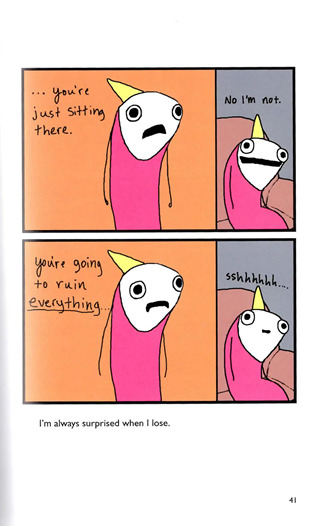
Most of Brosh’s panels behave in the same way, providing the reader with concrete examples of often abstract concepts, like internal monologue and discussions with oneself.
One! Hundred! Demons!author, Lynda Barry, achieves this same concept by forcefully changing the reader’s perspective. As she reveals the story of her struggle with impostor syndrome as an author and her childhood tendency to let her imagination run away with the descriptions in the Classified section of the newspaper, the reader follows her through her childhood musings and is dropped into the middle of one of her fantastical plots.
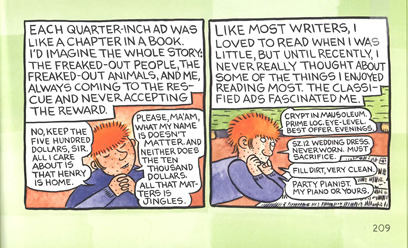
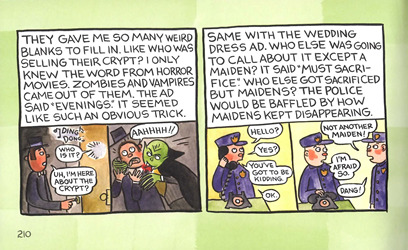
Only when Barry transitions back to a narrative focused on her own more present-tense position as a narrator do we as readers get dragged back into the present-past-tense of her childhood self.
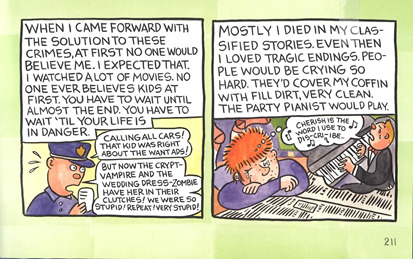
Brosh maintains a slightly smoother sense of temporal immediacy by clumping her panels in “Motivation” together, as one “Motivation Game.” Readers are taken along the same journey, into and back out of, the author’s imagination and altered psychological state, but Barry’s follows tactics familiar to comic readers, while Brosh blurs those lines a bit for readers unused to comics.
This difference in delivery of the protagonist’s inner-world carries over into the way dialogue is associated with each character as well. In the above examples, from One! Hundred! Demons!, Barry uses the classic speech bubbles historically associated with comics; Brosh, on the other hand, utilizes both classic speech bubbles as well as free-floating text that the reader infers to be audible speech through context clues.
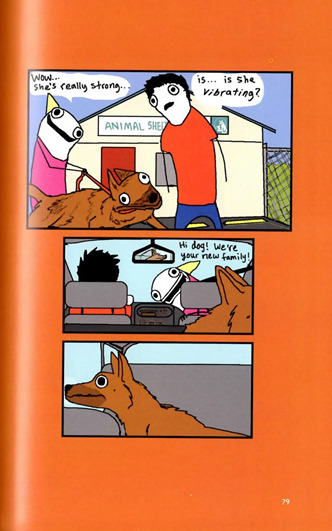
In the chapter “The Helper Dog is an Asshole,” Brosh retells the story of her and her partner’s adoption of a second issue-riddled shelter dog. She uses both dialogue vehicles on one page, in succession, the traditional speech bubbles allow each character in the top panel to convey separate thoughts, while the speech in the middle panel is only spoken by Brosh’s caricature of herself, as she is the only character “facing” the audience.
Brosh utilizes a similarly comic-style tactic when expressing active motion or a change in mental or emotional state. In “The God of Cake,” she recounts a childhood obsession with conquering her mothers demands that she not decimate her grandfather’s homemade birthday cake with her youthful inability to control her own sugar intake. She masterfully illustrates this rapid descent into the kind of one-track-minded madness only children ever master with a four-page sequence of successively blurry panels.
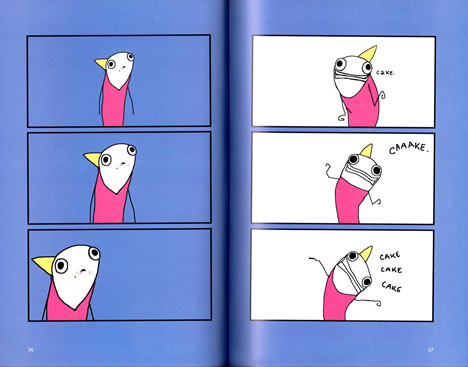
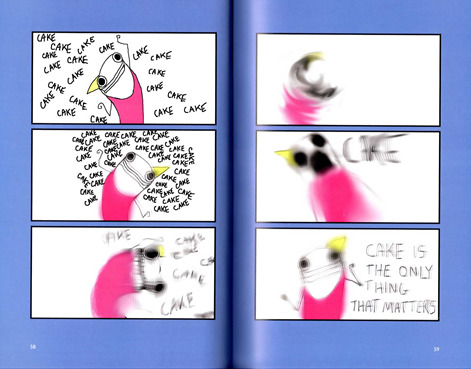
No, that’s not a mistake of my scanner, it’s printed that way in the book; while a little difficult to read, I think it conveys an emotional whirlwind with an immediacy that helps the reader understand just how much untamed tenacity is bubbling beneath the surface for this child character through the remainder of this chapter.
Another tactic that Brosh employs, that seems like a holdover from her work’s origin as an online blog, is her use of a colored filter over a panel to illustrate distress or another intense emotion. In the same chapter retelling her story of the “helper dog,” Brosh lists the myriad and often confounding behavior issues the new dog frequently displays, like her visceral and adverse reaction to other dogs. Brosh posits that the new dog must simply be unable to comprehend or abide by the fundamental existence of other dogs in the world. To depict the abrupt and unpredictable change in this dog’s mental state, Brosh uses a red tinted filter, along with grumpy-looking smiley faces and hand-written text over her base illustration of her new dog lunging toward another dog in the distance, teeth bared.
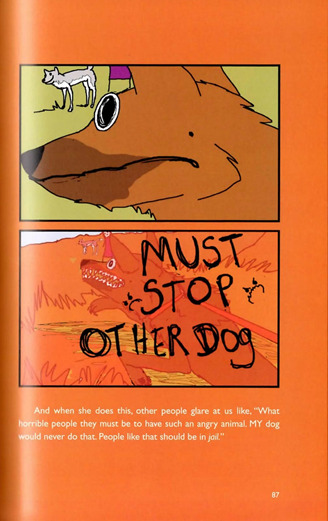
You can almost hear the Kill Bill sirens going off in the background.
While Brosh’s artistic approach is reminiscent of internet memes, it also resembles the cartoon-y illustrated style of altered mental states in comics. In One! Hundred! Demons!, Barry juxtaposes alternating bright contrasting colors with radiating squiggly lines in a few of her panels to symbolize the acid trip she and her truncated crush are having on their roam through China Town and Skid Row.
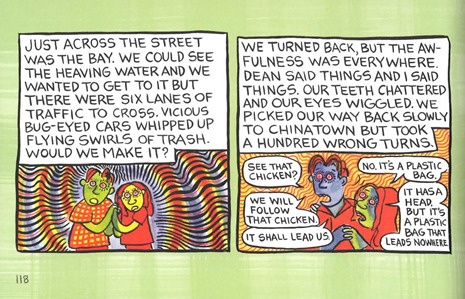
Instead of giving the audience a sense of almost seeing through the perspective of her dog’s psyche, like Brosh does, Barry’s interpretation of her own childhood experience makes the reader feel a little like a sober friend along for the ride, understanding what’s happening, but not able to reach quite the same level of empathy.
Although comics are typically regarded as a reading material relegated to childhood hobbies, books that fall between the borders of comics and illustrated novels, like Hyperbole and a Half, prove their usefulness as a narrative medium, and for readers afraid of being seen reading a full-blown comic—or have never even attempted it, can consider them the shallow end of the comics pool, a lighter commitment than the image-heavy ocean of traditional comics.
Brosh, Allie. Hyperbole and a Half: Unfortunate Situations, Flawed Coping Mechanisms, Mayhem, and Other Things That Happened. Gallery Books, 2019.
ISBN: 978-1-4767-6459-7
10 notes
·
View notes
Text
yo te haré mía (cnco) - ch9
Chapter 9
Words: 3,200+
Warnings: first scene has light implications of smut. second scene you’re fine. third gets a little raunchy but not down and dirty.
A/N: all necessary things to lead up to Ch 10 when the real shit starts going down. sorry you waited so long for something so meh, but it gets better. swear. chapter 8 is here if you want to catch up.
Zabdiel slid his heavy steel rings off his fingers into a jewelry dish on the nightstand as he sat on the edge of his side of the bed, heaving out a sigh. “He's finally asleep.” Isabella muttered in assent, brushing her hair out over her shoulder before sliding beneath the bedsheets. “I feel horrible,” he grumbled, rubbing his palms over his cropped hair. “I do miss spending time with him. I feel like this whole album has taken over everything.” He rolled his shoulders with an audible huff, shedding his t-shirt and making short work of sliding his jeans to the ground. Grouping the laundry together in a ball he tossed it into the hamper, a small grin at the victory. “It should all be better once the new album is done.” Isa rolled to the inside of the bed, facing toward him for a change. “And after the album is promotional things and interviews, after promo is a tour, and after a tour is another album. There’s no slowing down or stopping, Zabdiel.” He collapsed into the pillow beside her, his arm thrown haphazardly over his eyes, almost in defeat. She tucked her hands under her head. “The cycle of your career won’t stop. And the difficulty with your family won’t stop until you show some effort.” He lifted his arm off his face and lowered his gaze to meet hers. “We're not only talking about Joaquin anymore, are we?” Isa looked down toward the lump in the sheets where her toes were hiding. “You have to understand,” she began slowly, “how alone all of this has made me feel.” He huffed, throwing his arm down on the mattress beside him. “How am I supposed to know how you feel if you don’t tell me?” She still couldn’t look to his face. “How am I supposed to tell you how to parent, how to be a husband? Your sole focus right now is being a musician. It’s frustrating when the people on the outside of it have to cope without you, but it’s been so long we’ve gotten used to the situation. It just doesn’t make it easier to stomach.” Zabdiel stared up at the ceiling, clearly ingesting her words and now deep in thought. He was silent for a few minutes, no sound but their slow breathing. She knew that she had probably been harsher with him than was necessary, but clearly it had made an impact. She was just sure it would change nothing. “I promised you,” he started slowly, turning his body towards hers and trailing his hand down her arm until it clasped hers, “that I would be faithful, loyal, and loving, and I haven’t been that to you in a long time. I’ve taken you for granted and I’m sorry.” The shock set in and her mouth was too dry for her to speak. He squeezed her hand affectionately. “Maybe a little island getaway for the two of us before the baby comes?” She was a lot more hesitant about it than her immediate response let on. “I know that you need new inspiration for your love song. Being so tranquil and relaxed on vacation will make you a better songwriter.” “Amor, no.” Her gaze still focused away from him, he leaned down so his lips could meet hers. Surprised by the kiss, she looked up and met his eyes. “I want to be a better man for my family, a better father, a better husband for you.” She shook her head against the pillow, tracing her fingertips over his that were tightly clutching the pillow from underneath. “You can’t do that and put your music on the sidelines.” He shook his head in agreement. “No, es cierto, pero I can take small steps to show you all you mean to me. Saying it is only one part. You deserve to be shown it.” He sat up on his knees to be able to reach into the drawer in the table of the nearby nightstand. “I had this to give to you when we were going to go out tonight, but we didn’t really get that chance.” Retrieving a small jewelry box, he presented it in his hand that lay in his lap. She sat up beside him, hesitantly examining the box with her eyes, unsure if she should reach for it. “Izzy,” he chuckled, “I promise it won’t bite you.” Lifting the lid, she revealed inside a small silver oval locket. Engraved across the front were the the words “te recibo a ti” and in flipping to the back to find the opening there was the continuation “y me entrego a ti”, a line of the vows they’d made at their wedding. A button sat below the hook of where the locket connected to the thin chain and pressing the button lightly opened the hinge of the locket. On the left panel was a thin layer of glass covering a backdrop of diamonds, a miniature blue orchid like that of her wedding bouquet pressed between. The right panel held a small photograph of the two from their wedding, staring into each other’s eyes with unmistakably genuine smiles. He lowered his head to be able to press his lips against her forehead. “Te lo prometí, mi amor, and I’m sorry I haven’t been acting like it. Pero te amo, y siempre te amaré.” The genuine thought and effort to create something so meaningful struck a chord in her heart. For so long, she had believed him incapable of any sort of effort involving her. Perhaps she had lost the will to put forth effort when she thought he had also given up. But he clearly hadn’t. The tears that were threatening to fall from her eyes were stopped as she shut them to pull him close and kiss him deeply. He shuffled the box back to the nightstand as he lost himself in her lips. And as his body fit to hers and they physically reconnected, she had to think that this was the connection that they had both been missing. And as they laid tangled in each other afterwards and he fell into peaceful sleep at her side, she couldn't help but stay awake wondering if now that they were trying to mend things if her secrets with Christopher would be too much to overcome.
-
Chris was never early to anything. Ever. But the lack of sleep he’d had the night before had him awake anyway, so he figured he might as well head to the dance studio for choreography rehearsal. It might have even given him time to relax and take his mind off of his best friend’s wife. If his best friend hadn’t been the only other person in the room. “Hey, man, ¿como estas?” Zabdiel was always so energetic even before caffeine and it was almost frightening. “Exhausted pero estoy aquí," he mumbled, rubbing his palms over his face. “¿Quieres café?” Zabdiel offered, reaching for his wallet and ready to run down the block to the Starbucks. “Nah, esta bien,” he murmured. “I already had a cup when I left.” He didn't want to admit that it was to shake how drunk he still had been from the night before. Knowing that Zabdiel was spending a romantic night with the woman that should have been in bed with him had been too much to mentally handle while sober. “You’ve been pulling late nights with Krista for a while though, hermano,” Zabdiel mused. “¿Que esta pasando?” “She’s stressing me out, bro,” he groaned, the still tipsy mind revealing the true thoughts he usually kept under wraps. “I get that everyone is talking about us and the new music. It’s bringing publicity like it was supposed to. I just can’t stand being around her anymore and she tries to make it real. I don’t want it.” Zabdiel studied his friend’s expression and how the stress didn’t leave his face when the alleged cause had been spoken. “That’s not all.” Chris tugged on the brim of his fitted cap and pulled it slightly over his eyes as he sat down against the mirrored wall. The only time Zabdiel had seen his bandmate engaged and excited lately was when he had been in the studio texting that girl, then writing that passionate ballad. “¿Crees que no estas feliz con ella porque estas pensando en otra?” Zabdiel chuckled. With the silence that followed, he quickly realized that it was less of a joke than it was hitting the nail on the head. “Si no estas feliz y quieres otra mujer,” he said softly, “¿por que no puedes acabar lo que tienes con Krista para empezar algo con la otra?” “It’s not that simple,” Chris muttered. “Why not?” Zabdiel asked, ending his bicep stretch and shrugging his shoulders to loosen them. “La otra esta casada,” Chris confessed. Zabdiel chuckled again before the uncomfortable realization sank in again that he again was not joking. “¿En serio?” “I know, man. It’s fucked up.” Christopher tossed his cap to the floor between his feet. “I knew her before she was married. And she’s told me she’s in love with me too. She just… She won’t leave him. And I don’t know what more I can do. I don’t want to break up a home but… Estoy tan enamorado. I… can’t live without her.” Zabdiel anxiously gnawed on the top of his water bottle. He couldn’t dare tell Chris of his secret that he had not taken those sacred religious vows as sincerely as he ought to have. But he understood the pull of love in the positive and the negative directions, and he refused to allow his friend to suffer with no love at all. “Pues, if you both are in love, it will work itself out. It’s complicated but you should hold on to something if it’s that undeniable type of love.” Christopher fiddled with the sideswept tendrils of his angled bang, letting out a nervous exhale. “How can a man who has a wife tell me to steal one?” “If she loved him enough,” he asserted, “then she never would have began anything with you at all.” Christopher exhaled heavily through his taut lips. "Tal vez.” “Sabes," Zabdiel reasoned, “If you feel love for her and her marido does not, then it’s time for it to be done and for the both of you to be together.” “How can you tell me that? You’re married. Imagínate-“ And Christopher stopped at once, realizing just what he was asking Zabdiel to envision. Zabdiel shook his head. “If her heart doesn’t belong to him, you’re not wrong.” Christopher scoffed. “Someone as pious as you- you don’t believe marriage is sacred? A commitment before God? How can you give me advice when you…” “Marriage is difficult. No one involved in one is ever perfect. I’m sure Izzy and I have not been perfect. But love is different than marriage. Love is something I understand, and I know how you must feel. You can’t let go of what you feel.” He sat across from Chris, still toying with the plastic spout on his water bottle. “It’s more complicated than that,” Chris whispered, regretting having allowed the subject to surface at all. Zabdiel continued, “Fear isn’t as strong as love. And I know the situation is scary, but you have to fight for her. You love her, right?” Chris kept his eyes pinned to the floor. “I’m in love with her. I can’t imagine my life without her. I look at my future and I see myself with her.” Zabdiel shrugged. “Well you have your answer.” Christopher toyed with his shoelaces, anxiously needing to busy his fingers. “It’s wrong. She has a husband and a life. I’m trying to let her go and let her be happy.” Zabdiel studied his friend’s nervous movements, trying to read what Christopher left unspoken. “You’re still having sex with her?” Again his silence was enough of an answer. “Then you’re not really trying to let her go.” Chris shook his head. “I want to do the right thing. I’m just in love with her, bro, and she loves me. She just won’t leave him.” Zabdiel leaned over and clapped his hand on Christopher’s shoulder. “It will work itself out. And you know I’m always here for you.” “Gracias, man,” Chris said, flipping his fitted cap on backwards and rocking his head back and forth to each shoulder as if it would shake the thoughts of her out of his mind. Zabdiel gave an acknowledging nod, trying to rid himself of his own advice. If they’d really been in love, one wouldn’t have strayed to start with. Maybe he didn’t… Maybe his indiscretions with Krista were telling him that it was over with Isabella and this trying to make it work was a futile effort. Richard, Joel, and Erick walked in with their coffee a moment later, joking and laughing from whatever they had spoken about on their trip. “¿Listos, chicos?” Richard asked, throwing down his cinch sack and taking a long chug of his iced macchiato. Clara pushed the doors open behind them and rushed ahead to stand in the center of them all. “Stop. Everything.” she panted. “We’re not rehearsing today.” “¿De que hablas?" Erick asked, tilting his head like a puppy who had just heard a foreign sound for the first time. “We’re going out and celebrating,” she started with her trademark beaming grin. “¿Estamos celebrando que?” Erick pushed. “You guys,” she squealed, “were just nominated for a Grammy for Album of the Year.”
-
The evening had spun out of control pretty quickly. The early afternoon was all the boys huddled in the dance studio, tweeting and posting to their instagram stories about the Grammy details. They eventually made their way back to SONY to go over specifics for promotion, did a Skype call with Ricky Martin from the conference room, and called in to three radio stations for interviews and congratulations. Only then did they get the opportunity to call everyone they knew, who already knew because of the social media posts. It was decided that the evening would be made into an impromptu party at Zabdiel’s house. Noemi was more than happy to take her grandchildren for an unplanned sleepover so her son could have the chance to properly celebrate with his friends. There was always enough liquor in the spread of their basement to take care of all friends, production, and family. And it had all night long. Isabella being so far along pregnant couldn’t drink so just tended to all of her husband’s guests. Most of the producers, DJs, and fellow artists in their circle had left after one in the morning. Clara caught an Uber back to her AirBNB with Kevin about two hours after. Joel had been playing billiards with Chris but disappeared about half an hour before in search of a snack and had yet to return. Yashua and Richard were aggressively playing basketball on the court right outside. Erick had been playing Xbox games alone but had stumbled up the stairs to find Joel for further competition and had been lost for ten minutes. Zabdiel, as was common in most situations, had sat on a corner of the couch and fallen asleep. Having consumed more than his fair share of alcohol, there would be no waking him now. Chris had thought this out almost strategically. His celebration would be best experienced sober when the rest had ended their night and he got the opportunity to be alone with her. He had a few drinks sporadically throughout the night, but to keep up appearances only, not to drink to excess. He placed his pool cue on the table and stepped quietly over as Isa covered her snoring husband with a blanket. "¿Necesitas ayuda?" "No, estoy bien, gracias,” she said softly, visibly stiffening. “Gracias por todo lo que has hecho esta noche, amorcita,” Chris breathed, skating his hands up her hips and breathing softly against her ear. “Christopher, what are you doing?” she hissed, knowing she should break away but falling further back into his embrace. “What I’ve wanted to do all night,” he murmured, kissing a path down from her temple to the base of her neck. “Are you insane? Zabdi is right here,” she seethed, wriggling in his arms. She stared at her husband’s sleeping body beside her and gasped, but felt electricity surge through her as Christopher’s hands stroked down to the apex of her thighs. “Y el no tiene que saber nada,” he groaned, pressing into her. “Todavía estoy enojada contigo,” she moaned quietly, winding her waist against his. “Obviously.” He nipped at the nape of her neck and slipped his hand into her jeans. “We need to stop taking shots at each other and just accept we’re in love and this isn’t over.” His fingertip touched her clit and she clutched his wrists for stability. “Amor,” she exclaimed, begging for nothing specific but she didn’t need to say it. “You want it,” he insisted, his growing desire pressing into her from behind. “I know it. You push me away but it’s because you’re scared by how much you need me.” “Christopher,” she gasped. Zabdiel stirred in his sleep and Isa jumped, jerking her body to the side which only made the friction of Chris’ hand send more sensation up her spine. “Ay, Dios mio.” “I shouldn’t have pushed about the baby,” he murmured, now pulling the collar of her top down so he could lay open mouthed kisses on her shoulder. He feared her moving away again but saw she was too lost in pleasure to react. “I’m sorry. I just love you. I want you. I want all of you.” “Fuck me, papi,” she pleaded, leaning forward to grip the back of the couch. Chris withdrew his hand and smirked, sarcastically repeating her warning. “Are you insane? Zabdi is right here.” “A mi no me importa,” she sighed, turning to face him and gripping the back of his neck to pull his head down to meet hers. She kissed him fiercely, threading her fingers through his hair and pulling him as close as her belly bump allowed them. It was an immediate spark that ignited a wildfire. It didn’t matter how wrong it was- something this intense could not be so easily extinguished. He roared into her mouth as he kissed her, his one hand sliding up her back and his other sliding to grab her ass. He took a brief breath between their parted lips just to say, “Lo siento. Te amo tanto,” before pouring himself back into their kiss. In the back of his mind he realized that he shouldn’t be debating about whether to set her down on all fours next to her unconscious husband or to bring her up to bed, but the thought was all that was running through his mind. He stopped again to ask how she wanted to continue, only to hear stammering from the staircase. “¿Q- Que hacen?” Isa and Chris both whipped their heads around to see Erick, mouth agape, staring at them from the doorway, surely having seen the entire thing.
- chapter 10 is now here
69 notes
·
View notes
Text
CHAPTER 1 aka “Stranger Danger”
I’m rereading The Property of Hate by @modmad and overanalyzing it to hell and back because i can’t stop thinking about the story and getting madder and madder about the PUNS I keep finding. I’m scratching the itch and trying to find All The Details. Current plan is just to go chapter by chapter, feel free to chime in with stuff I miss! There’ll be a masterpost up soon linking everything in one spot
SPOILERS are sprinkled around extremely liberally. Masterpost
Okay, so just a million things right off the bat on page fucking one
‘The Hook’ is of course a term for the beginning of a story. Grabbing one’s attention and convincing them to go off on an adventure, so to speak
Speechboxes! Everybody’s got their own distinctive ‘way of speaking’ in this story. RGB’s are rectangular, but those straight edges are offset by these really loopy, meandering, and elegant speech tails. It’s just. Such immediate characterization.
Like, even the pose. The way RGB introduces himself by crouching on her drawers like an incredibly dapper gremlin. It creates a similar contrast to his speechbubbles- prim and proper existing simultaneously with fae and kinda ridiculous
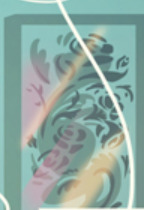
So considering we’ve got a fairly detailed picture of roses up on Hero’s wall on the comics opening page I think we can assume this is some type of Important maybe. Just off the top of my head, isn’t the rose Englands national flower? IDK how relevant that is outside of RGB being incredibly, incredibly British
Oh god damnit I just scrolled down to go to the next page and fffFFFUCKING BLUE ROSES ON THE BUTTONS okay. Blue rose symbolism! They don’t exist naturally. You won’t just find one in the wild outdoors, so they represent the impossible, the mysterious and achievable.

Seeing blue roses right off the bat = important story theme probably. Impossible dreams are my first thought. RGB’s seemingly hopeless plan to save a world everyone else has given up to be doomed. Hero’s wish to go the fuck back home please after she’s had her fill of deadly adventure. RGB and Hero are setting out to achieve the impossible, defeat Her, and save the World of Make Believe
Last point for the first page; RGB’s drool. Except it’s not drool, we later learn it’s equivalent to blood, and he bleeds emotions he’s feeling. While recruiting Hero, RGB’s prominent feelings are, unsurprisingly in hindsight, a fair load of sadness but tinged with a dose of cheer. His last Hero failed, and every single one before that, but he’s still daring to have hope, the absolute madman. What he’s actually dripping most though is what looks like curiosity- it may be mixed with a bit of anger, which I wouldn’t begrudge the guy. Angry that he has to start over, again, angry that his world is dying, angry that he’d the only one doing anything about it
Ok but imagine you woke up to find a man crouched on your bedside table smiling this super-wide “TRUST ME!! :)” smile and blood dribbling out of it and welling up between the teeth. Like, I’m laughing, but I’d be screaming
OKAY BUT FINALLY WE’RE PAST THE FIRST PAGE. We get a clear look at Hero’s drawings taped to the wall, and check it- one kinda looks like the Idea they run into a few chapters ahead. The other picture might also be showing the House of Paint? I mean, there’s a sun there so that’s off, but the clouds and steps leading up to Madras’ door look right
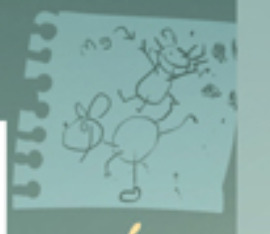
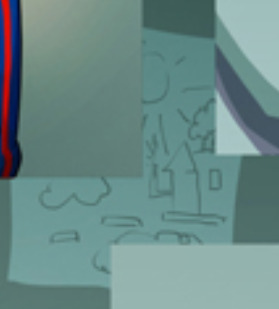
And now we get Hero’s speechboxes! They’re circular in contrast to RGB’s boxes, and colored orange. The balloon tails don’t loop-de-loop all over the page like RGBs but they’re not ‘standard’ either- there’s always this little jag to them closer to the text
RGB’s speechbubbles are actually one of the plainest/most conventional in the entire story
Excluding the tails of course. Those never ever take the most direct or efficient path to his face. Yeah, it adds an impression of silliness, but also speaks to the fact that RGB takes creative and weird solutions out of situations. I’ll laugh about the entire Click arc later but like really. REALLY. RGB DID ALL OF THAT
I love how Hero’s first actual words to RGB send him immediately into ?????????????. He keeps up this huge grin for most of The Hook and this is the first time his “I’m your friendly neighborhood TV nothing to see here!!” demeanor gets shaken up
the ladder hurts Hero’s feet, so why does she sleep on the top bunk? The bottom bunk doesn’t have any bedding on it so it’s not like she’s regulated to the top by any kind of sibling dibs
Weird... weird detail to be showing us modmad.....
“Are you a monster?” “the very worst one” that’s a lotta blue dripping off yer chin there, stop crying
The mom is a character for two (2) seconds and even she gets her own unique speechbox; blue, fuzzy and barely connected, which does a really great job of communicating that she’s basically still asleep without ever having to see her
‘happy boi about to bring newest kidnapping to the sky world’
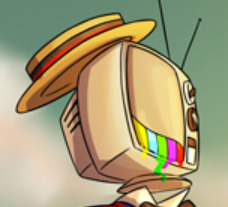
That’s a Mary Poppins reference, that is. RGB exclaiming ‘spit spot!’ earlier also got be thinking of Poppins

Clouds look so fluffy out of airplane windows, I’m honestly jealous
Doors! Gotta wonder where they all lead. Gotta wonder if they’ll get more use past this outside Hero’s recovery Time
I’ve just spend like 15m trying to figure out what the symbols above the doors are and I THINK it’s alchemy? “libra sign upside down” is luckily an easily searchable term, and that symbol in particular is for gas becoming liquid
I think the door beyond that has the alchemical symbol for gold? I’m not having luck on the others, including the door they actually go through here/its sister door Hero opens after the Elastic Valley fiasco.
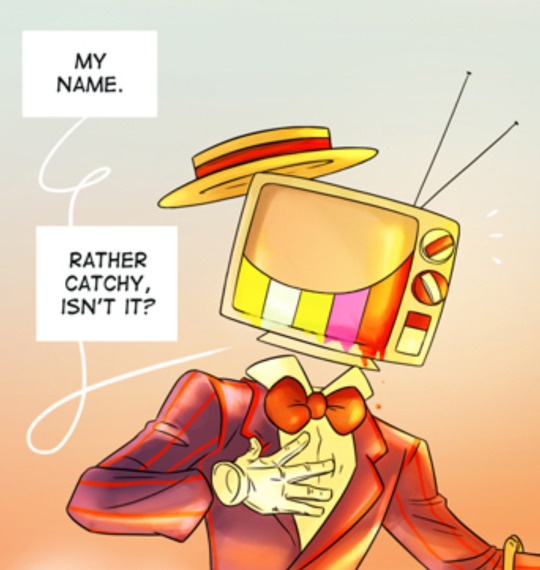
RGB are you pissed that you had to tell this kid your name yourself? Are you upset about manners?? She’s like 7 dude cmon have you met a 7 year old. Thinking about it, possibly not, all the confirmed Other Heroes are definitely older- they all come across to me as adults
well, actually, who even knows how old Assok is. They might be the exception
The little ‘peephole’ eye popping open when the right key is close is nice atmospheric detail, but it kinda makes me wonder if there’s a person like. Seeing out of that eye. Whether someone gets a little notification every time one of these doors is opened
It’s the World of Make Believe! Stupendous! Break-taking! Modmad is exceptional at colors and beautiful environments full of personality! Hero’s last chance to turn back is gone!
Hero only being awake for 20 minutes before becoming Instantly Tired = biggest actual mood, my god. Me too sweetie
Except I can’t blame trees. And a sort of magical jet-lag effect. Yo, are sleeping tree’s making you sleepy the same sorta thing where when one person yawns everyone yawns
I just really like how this tail loops around RGB’s physical actual legs. It makes it seem like speech is a tangible thing that interacts with the world and that you could, like, touch or something. all it’s missing is a shadow

God, fuck me. That’s the yellow brick road. God dammit. Son of a bitch.
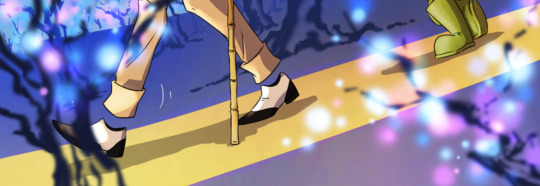
RGB, pg 14: do not touch me, do not look at me, don’t speak to me, you have tentative permission to breathe
RGB from the Market onwards: carries her multiple times (admittedly, almost always exactly like you shouldn’t), picks her up, swings her around, hugs her when she’s scared of the dark, ‘I Have Longer Legs, Hop On’ piggybacks, protecting her by putting his own bod in harms way, general Manhandling of Child
I kid, I kid, it’s more complex than that. For one, RGB doesn’t want Hero getting hurt cause she’s Important and has Heroing she can’t do if she’s injured. Second, that whole “don’t get attached” thing gets thrown out the window on like day 2
“I’ve only known Hero for a day and a half but if anything happened to her I’d kill everyone in this room and then myself”
RGB is honestly... super bad at not attaching to people. honestly, actually terrible at it
Ooh! Those flowers! I didn’t realize those always happen when Hero’s sleeping. They also look like she’s drawn them herself! That’s honestly… lethally adorable

Fun fact technicolor dream shell snail changes colors every panel
RGB bleeds static? What emotion is that? I dig it, unconscious is an emotion and i feel it in my soul
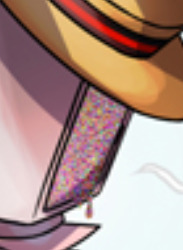
w...white noise.... god DAMMIT
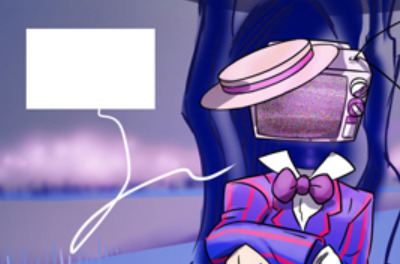
ey, the tree’s look different in the light of day- all those blurry fairy light ‘leaves’ are gone now.

!! Hero glows the exact same way when she’s asleep! RGB, however, is not. Tree’s have leaves when they dream, huh
oh god tree’s have LEAVES when they DREAM
...we’ll come back to this thought when we get to the sick sun tree cause that thing is a whole other can of Lore worms
In a different direction, there must be some sort of difference between Tree Dreaming and People Dreaming, because dreaming trees do NOT trigger RGB’s weird stuntman nightmares
these particular trees are also see-through; i can’t remember if they’re all like this throughout the world? will have to pay attention and see
oh- OH. also just made the connection for why trees provide a saf(er) haven- bottled nightmares will very shortly be used to dispel fears. Dreams repel Fears! It’s best to sleep near tree’s because just you dreaming might not be enough to keep things at bay while your rest
And the chapter’s finished off with a new character and new speechbox to go with it! It’s the first to use a different font and text color to our main characters
Honestly though, what is UP with the Butterfly? It’s clearly keeping close tabs on them, and only speaks to Hero when RGB is unconscious or otherwise occupied. It clearly doesn’t wanna be seen by him, which is shady. It shows up like twice? And the other time RGB and Hero don’t even know it’s there and listening. Between that and the Eyes, like… does it have it’s own agenda and interests or is it an agent of Hate? Idk man maybe I’ll pick up on more Butterfly stuff on this readthrough

*notices that the plant it was resting on withers once it flies away* ... that’s no good. especially if that butterfly can do the same to trees
...... ah. it kinda can. Consider, please, Hate’s likely role in the demise of the Sun, and Her confirmed ability to smother them in [-----]
Butterfly’s parting words: “be wise”. Hero’s next and immediate action: doodle RGB’s face
And that’s the Hook! Join me next time when Hero has a fun play date with some new friends everything goes wrong almost instantly.
#tpoh#the property of hate#tpoh meta#the specific tag for this adventure will be...#tpoh time with Gill#i assure all of you i make these posts out of love
2 notes
·
View notes
Photo

New Post has been published on https://magzoso.com/tech/philips-bdm4350uc-43-inch-4k-ultra-hd-monitor-review/
Philips BDM4350UC 43-Inch 4K Ultra HD Monitor Review

Laptops may account for the bulk of computer sales, but it’s hard to argue against the advantages of a big screen, especially when you have to juggle multiple apps at the same time. A big, high-resolution display opens up possibilities that even the biggest laptops cannot aim to match.
And they don’t come much bigger than the monitor we’ll be reviewing today. We’ve had the chance to spend a few weeks using the Philips BDM4350UC, a 43-inch 4K LCD monitor, to see whether a really big screen can turbocharge your productivity. Could this be the monitor of your dreams? It’s time to find out.
Philips BDM4350UC design and specifications
Given its size, it’s no surprise that the Philips BDM4350UC resembles a television more than a traditional monitor. In most cases, monitors — except ones with atypical aspect ratios — look like smaller televisions, save for the fact that most of them have stands that let you adjust their position in ways that televisions aren’t designed for.
But the Philips BDM4350UC looks just like any television of its size. In fact, installing this monitor involves fixing two legs stick out quite a bit on either side of the monitor, just like we’ve seen with large-screen televisions by the likes of Xiaomi and others. We didn’t have a table large enough to accommodate this monitor fixed to its legs, so we decided to leave them in the box.
Thankfully, the monitor is still stable enough to stand on its own without any problems, and that’s how we used it for the entire duration of our test period. Though there’s a slight tilt to the back when it’s in this position, it’s definitely not as stable as it would be with the legs, and we don’t advise using it like this out in the real world. With or without the legs, there’s no way to adjust the height of the monitor, nor do you have the option to tilt or swivel the display in any way, which is a bit of a change from many popular standard-sized monitors.
The sheer size of this monitor is something you’ll need to keep in mind before purchasing it, as physically, it may not just be a plug-and-play replacement for, say, the 24-inch monitor you’re currently using. It does have a standard 200x200mm VESA mount for wall-mounting, or for a third-party VESA stand that could enable tilt and swivel adjustment that the monitor lacks by itself.
The bezels aren’t particularly large, but this is no edge-to-edge monitor, and one could argue that it doesn’t need to be because of its sheer size. We never really noticed the bezels, probably because there was so much screen real estate occupying our field of view. The overall design looks and feels premium, and this monitor is nothing like most of the budget televisions that we’ve seen recently.
A small plasticky piece jets out from the centre at the bottom. This piece features a Philips logo and a small LED that stays on without attracting any attention when the device is powered on, and strobes gently when it is in standby mode.
All the ports are at the back, on the left-hand side (as you reach backwards from the front) near the bottom, except for the power inlet which is on the right. You get two HDMI 2.0 ports (with MHL), two DisplayPort 1.2 ports, and a VGA port for input. Additionally, you get four USB 3.0 ports, one of which is listed to support “fast charging”, and a USB-in port to connect the monitor’s USB ports to your computer. Audio-in and audio-out (3.5mm) ports are also thrown in for good measure. As we noted, all these ports face outwards, which did not prove to be a problem for us, but it might be a concern if you wish to wall mount this monitor.

The Philips BDM4350UC offers plenty of ports
The panel measures 42.51 inches (108cm) diagonally, which allows Philips to market this as a 43-inch monitor. The native resolution of 3840×2160 pixels is supported at up to 60Hz, with a claimed typical response time of 5ms. The peak brightness is said to be 300 nits, with a typical contrast ratio of 1200:1. The panel does not support HDR. There are two built-in speakers of 7W each, which sounds like a good idea in theory, and we’ll soon find out how they perform in the real world.
The monitor also supports picture-in-picture (PIP) and picture-by-picture (PBP) modes that let it display input from more than one device at the same time. There are no buttons at the front — there’s only one joystick-style button at the back near the bottom right that’s used to control all settings. It takes some getting used to the positioning and functioning of this button, but after a couple of days with the monitor we were reaching out for it and adjusting settings blind without any problems. A power button that can be flicked to turn the monitor on or off is also located at the back, though it’s not as easy to reach.
Philips BDM4350UC performance
In this section, we’ll focus on two main areas — the first, how it is to use a monitor of this size on a day-to-day basis, and the impact it can have on your productivity. The second is the performance of this panel itself, in which we will look at some benchmarks and other formal tests.
We connected the monitor to a Mac mini, and macOS defaulted to the native 4K resolution. We had no problems reading text and most other on-screen elements, so we didn’t bother scaling down to a lower resolution, though your mileage may vary. The only UI elements that seemed a bit too tiny for our comfort were the menu bar near the top right corner of the screen. Switching to 3200×1800 resolution resulted in a better experience.
With that said, we loved the extra pixels that the native resolution offers and switched back to it in no time, deciding to live with the slight discomfort of smaller menu bar icons. As you would expect, the 4K panel at its native resolution gives you an enormous amount of real estate, and as someone who’s constantly juggling multiple windows, we decided to make the most of it.
We dedicated one part of the screen to our email client, another to the browser, one to Slack (our chat application), and another to Google Analytics, which we love keeping an eye on in real time. We still had plenty of real estate leftover for other windows. While it was great being able to keep tabs on so many applications at the same time, we did notice some patterns in our usage.
Despite having all the additional pixels, we tended to position the “main application” — i.e. whatever we were focussing on at the time — near the bottom-left of the screen. So, while the mail client’s message list window stayed on the top-left of the screen, we composed emails near the bottom-left (thankfully the macOS Mail app remembers the winndow’s position after you’ve dragged it once). We found that the top half of the display was largely useless for anything other than monitoring apps that require an occasional glance.
While the ability to have large documents display on the screen in a tall window sounds good in theory, we found that looking at the top one-third (at least, if not the top half) of the screen for long requires too much effort, and it almost feels like watching a movie from the front row. We think that everyone will end up having “sweet spots” where most of the action takes place, with everything else in the periphery.
There are some other problems that arose due to the quirks of macOS combined with our usage habits. Notifications from Mac apps show up in the upper-right corner of the screen, and this is a behaviour that cannot be changed (other than disabling notifications altogether, of course). This means that if you’re focused on the bottom-left of the screen like us, it is all too easy to miss notifications due to the sheer size of this display. Even when we did manage to catch them, at times it seemed like too much effort to shift our attention to the top right corner and then back again to what we were working on.
We also booted into Windows on our Mac mini to see what the experience was like. By default, Windows resorted to 300 percent scaling, but we switched to 100 percent, and the experience was pretty similar to what we noted with macOS above. Text was sharp — even at 8-point size — and the overall experience was nothing like what you’d remember from hooking up your old, large-screen, non-4K TV to your computer a few years ago.
Of course to make the most of such a monitor, some people might need to change some habits. Many users who grew up using Windows are used to maximising their current window and using Alt-Tab to switch between apps. If you are someone who’s married to that working style, unless you are using apps like Photoshop or other pro-grade apps, you are unlikely to get much benefit out of a monitor of this size, and will likely see huge white (or black) bands on either side of your content.
Some of you might be worried about eye strain associated with using such a large display at relatively short distances. We didn’t experience any physical discomfort while using this monitor, but we’ve spent nearly every waking moment for the best part of the last 30 years in front of one screen or another, so we are probably not best suited to comment on the subject of eye strain and we recommend getting an opinion from a licensed medical professional instead.
As we mentioned earlier, diving into the monitor’s settings requires you to reach around for the joystick-style button, but we got used to it and the menu layout pretty quickly. The settings let you control basic stuff like the current input source, the picture format (widescreen, 4:3, or 1:1, though the latter seemed to have no effect and mimicked widescreen), colour temperature, gamma correction, brightness, contrast, and pretty much everything else you might expect (see images below).
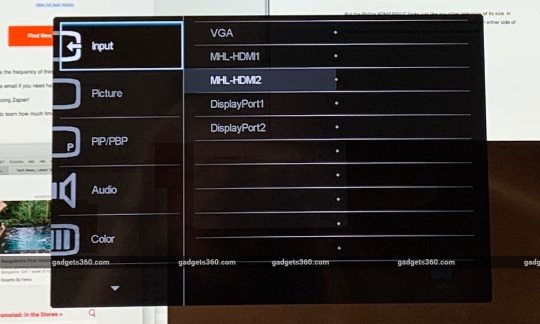
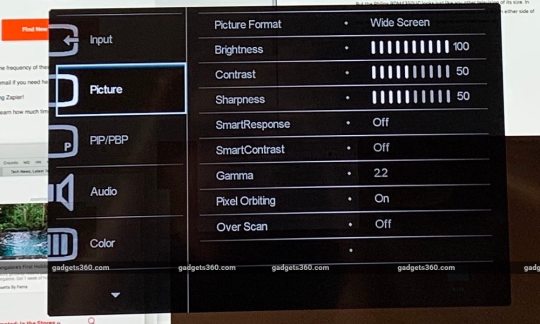
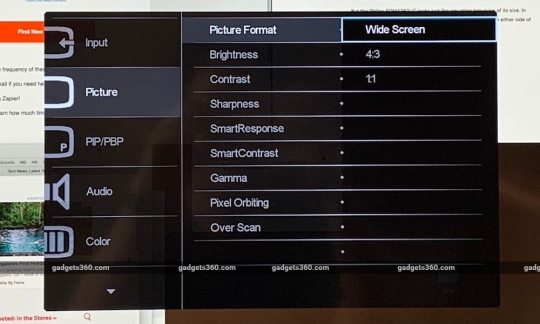
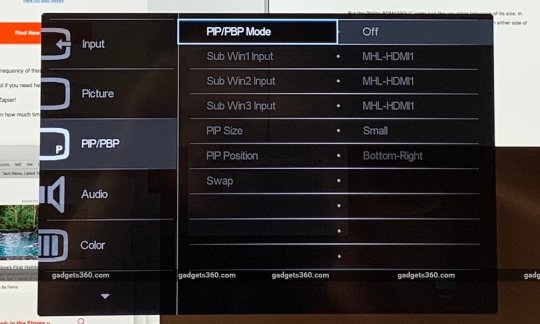
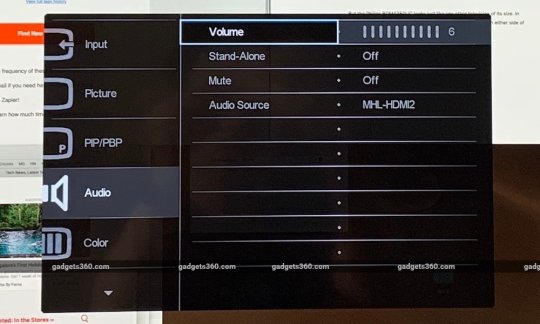

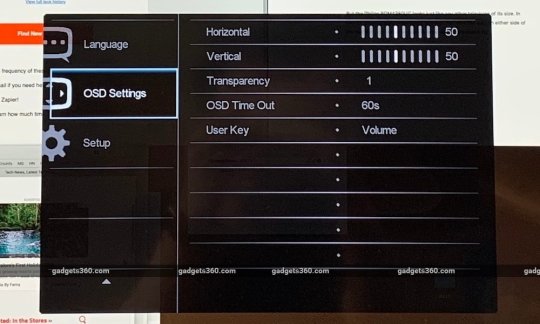
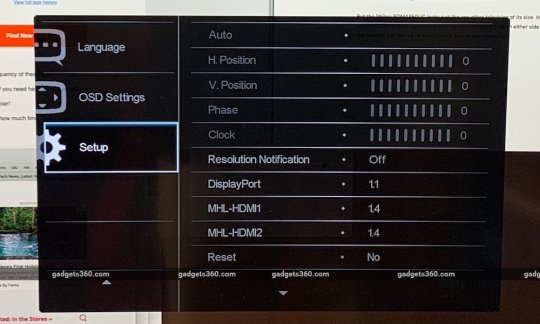
Philips BDM4350UC OSD settings
There are a bunch of standard features under Philips’ marketing names, such as SmartImage presets that are supposedly optimised for Movie, Game, and Office scenarios, and SmartResponse which is designed to optimise response time and reduce lag while gaming. We were fairly happy with the settings out of the box, but it’s good to know that the options exist for those who want a bit more control.
Our favourite part of the settings panel was the one related to PIP and PBP. The former gives you an inset that takes over a part of the screen. You can select which source gets to be the main input, and which gets to be the inset. You can customise its position(top-left, bottom-left, bottom-right, top-right) as well as size (small, medium, large), with the inset taking over a little less than a quarter of the screen at its largest size.
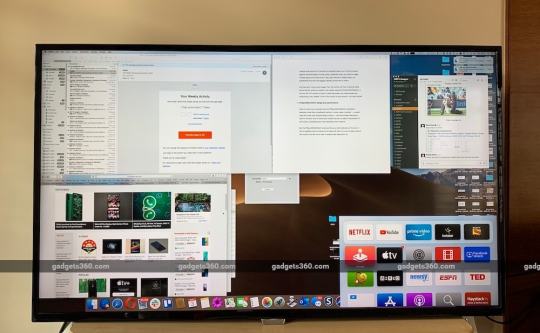
PIP on the Philips BDM4350UC with an Apple TV in the inset
We found this to be useful while, say, working on the main screen while having an Apple TV connected so we could follow a cricket match while continuing to work. Yes, you can easily do this by having Hotstar open in a browser window on your machine, and both ways have their advantages and disadvantages.
We appreciated the ability to use the Apple TV remote to control the video we were watching without interrupting what we were working on, though the disadvantage is that we couldn’t control the exact positioning of the inset, the way you would a window on your computer. which means it can end up covering important on-screen elements. We wish there was a way to use the joystick to position the inset exactly where one wants.
PBP lets you position two, three, or four sources side by side, without any overlap. This didn’t appeal to us a lot, but your mileage may vary. It’s a nice way to have, say, the same computer and Apple TV running side by side so one doesn’t get in the way of the other. To get the most out of this mode, it’s best to have the resolution of your computer set to 1080p, as each input in PBP mode is being rendered in full-HD resolution.
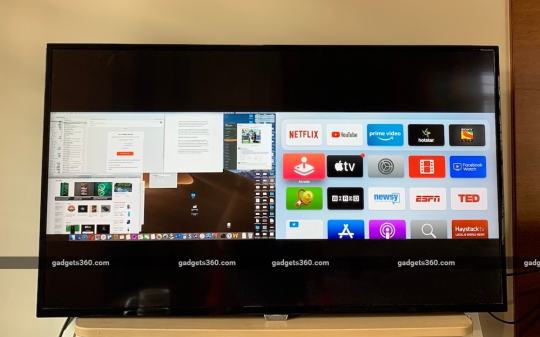
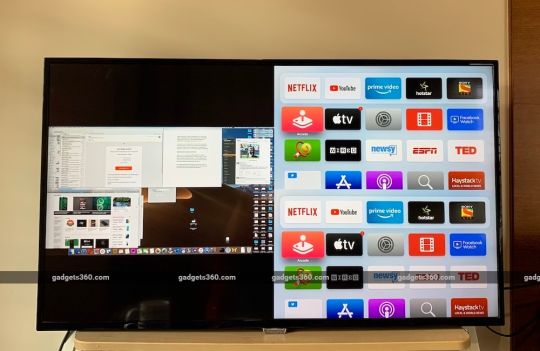
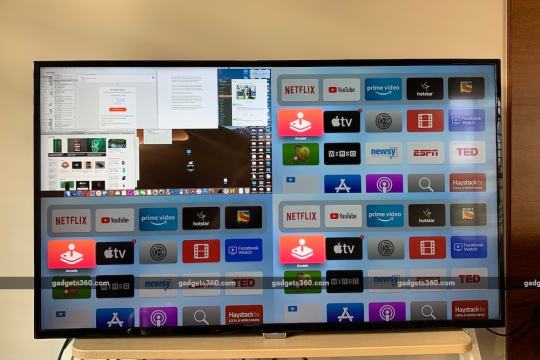
PBP with two, three, and four sources. We had only two devices connected, hence the repition.
In the PassMark MonitorTest Master Screen, running at native 4K resolution in the 16:9 ratio, the top left grille with a pixel spacing of one pixel appeared as a uniform grey colour instead of individual black pixel lines. We switched to 4:3 and could then see the individual lines. However, the centre circle which is expected to be a circle at 4:3 was more of an oval, while it appeared to be a perfect circle at 16:9. The opposite happened with the four smaller circles in the corners. We didn’t notice any blurring or smearing in the six coloured squares near the centre. Everything else on the screen was as expected as well.
The solid colour screens of the benchmark appeared fine, as did the Scale Black-Red and Black-Blue screens, though the Scale Black-Green appeared as a series of distinct vertical green lines of different shades, instead of one smooth gradient like in the other screens. In the Gamma Red, Green, and Blue tests, we noticed that the rectangular bar faded into the background at Gamma level 1.16. In the Fonts Test, the 6-point text was just about readable, with individual characters as distinct as we could expect them to be.
In the browser-based Eizo test, we noticed issues similar to PassMark on the opening screen, with the squares appearing as individual black and white lines in 4:3 resolution, but as a grey square at 16:9. We didn’t notice any defective pixels in any of the colours. In the uniformity test, we noticed that at 25 percent grey, the right half of the screen was brighter than the left, especially closer to the edge.
The monitor fared really well in the colour distances test, which means it can sufficiently differentiate between colours that are similar. Our colour gradients tests reported similar results to PassMark, with green being the only one that stood out as a little bit odd.
The Philips BDM4350UC excelled in the text sharpness test, with both White on Black and Black on White scenarios. However, the viewing angles test didn’t go as well, with noticeable changes in the sizes of the circles on screen as viewing angles increased. With that said, we didn’t notice significant degradation in quality when viewing content from odd angles in day-to-day usage. Eizo’s Gamma test indicated a value of 2.4.
We also spent a considerable amount of time using the monitor as a television, with a 4K Apple TV and an ACT Stream TV 4K media player connected to it. The monitor fared surprisingly well in this setup. Powering off the media player puts the monitor in standby mode, so we didn’t need to fiddle with the power switch. Power on a media player, and the monitor automatically switches the source to that input. The ACT Stream TV 4K media player has volume controls of its own, so we didn’t miss having a TV remote at all when using this as our video source.

The built-in speakers on the Philips BDM4350UC get loud enough to fill a large bedroom, and in all the time we spent with this monitor, we recall just one occasion when we wished they could’ve been louder, which could just be down to a poorly mixed show. Sound quality is good, and while there’s no real bass to speak of, the speakers are good enough to let you use this monitor as a standalone TV. You won’t need dedicated external speakers, though the audio-out port means you can do just that if necessary.
As far as picture quality is concerned, watching both HD and 4K content was pretty enjoyable, and while we didn’t have any complaints about the brightness of the panel, we did wish at times that the contrast ratio was a little bit better. In completely dark scenes, we also noticed a bit of “IPS Glow, especially near the right edge, though it wasn’t particularly bad. During the day, we found the glossy panel to be a bit too reflective at times, specifically when using the device as a television from a distance, though this wasn’t really an issue when we were sitting up close and using this it a monitor connected to our PC.
With a claimed response time of 5ms — and due to the fact that most PC graphics cards can’t drive 4K panels at their native resolution while offering consistent 60fps — this monitor isn’t targeted at gamers, so we didn’t run any formal gaming benchmarks. With that said, we did connect our Xbox to the monitor for a bit of gaming, and we were satisfied with the experience.
Verdict
There’s a lot to like about the Philips BDM4350UC. A 4K panel has the potential to greatly enhance your productivity, and this monitor delivers on pretty much everything it promises. Despite a few minor quirks, we didn’t find any major performance issues, and were more than satisfied with the overall experience. Creative professionals and others who can put the extra real estate to use will love what this monitor has to offer. We can also see this monitor being put to use in conference rooms as a high-resolution, all-purpose replacement for a projector, or on an office wall where the PIP/ PBP features can be used to display multiple sources at once.
However, as our time with the device showed, not everyone will be able to make the most of the extra pixels, and it’s easy to see in hindsight why many prefer using multiple regular-sized monitors next to each other instead of one giant 43-inch panel. Using such a large display as a monitor isn’t very practical and it’s easier to develop blind — or at least “non-preferred” — spots than when using a multi-monitor setup, as was the case in our usage.
With that said, if you are looking for a giant monitor that also doubles up as a television, the Philips BDM4350UC is a great bet. As much as we loved the PIP feature, even without that this monitor does a great job of being a television substitute, thanks to the good built-in speakers. All in all, we think this monitor will be a great addition to any home office where this kind of versatility could be particularly useful.
Price: Rs. 45,000 Warranty: 3 years
Pros
Decent overall performance
Plenty of inputs
4 USB 3.0 ports
Built-in speakers are good
Useful PIP and PBP features
Doubles up as a nice TV
Cons
Big panels aren’t great for all use cases
Contrast ratio could be better
Can be a bit too reflective at times
Ratings (out of 5)
Design: 4
Features: 4
Performance: 4
Value for Money: 3.5
Overall: 4
0 notes
Text
Justice League: Darkseid War: Green Lantern analysis

So I posted recently on how I was writing a big comics paper for school, and one or two people expressed their interest in reading it, so I figured I’d post it on here. It’s edited: the original paper was a comparison between this as a positive example of a single-issue story and another comic as a negative example, and for the sake of politeness I removed all references to that; this is just the chunk of the paper analyzing Tom King, Doc Shaner, Chris Sotomayor, and Tom Napolitano’s Justice League: Darkseid War: Green Lantern. Since I wrote this for school, it’s much drier and more formal than my usual writing here, and I’m writing on the assumption that the reader of the essay has essentially never read a comic before, i.e. is it successful at basic storytelling principles to carry the uninitiated, can you tell what’s going on if you’ve never seen or read a Green Lantern story in your life, etc. And for the sake of occasionally breaking up the text now that this isn’t in an academic context, I put in a couple splash pages from the story itself.
Spoilers under the cut; the assumption with this is that you’ve already read it.
“Will You Be My God?” opens with a simple non-diegetic caption box explaining the essentials of the situation for new readers, and given their presence in multiple cartoons across multiple generations, as well as an upcoming feature film, it’s difficult to believe a prospective reader of a Green Lantern title wouldn’t have an idea of who the Justice League and Darkseid were. Even without the box however – whether a reader sees it as a courtesy or a crutch – the setting, situation and stakes are established clearly within the first three pages, even for the most disengaged of readers. It is made organically clear, through both contextually-justified exposition and easily decipherable offhand references, that:
A. The Green Lantern Corps is likely a space military of some sort, given their army-esque creed of “We live as Lanterns! We die as Lanterns!” They explicitly utilize their will to achieve their power – presumably via their rings, since John speaks into his – and most likely their Central Power Battery (which we know is tied into them, as it also will-powered) marks this “Oa” as their base of operations.
B. Their enemies are clearly on the side of evil, as they are servants of a deceased being known as “Darkseid”, whose name is a clear tip-off if his noted status as a slaveholder did not make it clear enough, marking the Green Lantern Corps as our assumed ‘good guys’ given they oppose them (their refusal of greater power when offered also speaks to a humility indicating beneficence). The item we will later know as the Mother Box seeks for one of them to become a replacement god, informing the reader as to Darkseid’s status, and therefore the scale of the conflict. Their method of attack in turning Lanterns into Parademons is made clear both in-text and visually; we first see a Lantern brutalized, then many, then one is grabbed, another is strung up, and finally one is shown with the process complete.
C. The recurring figure is assuredly Hal – he is presented as the lead of the story by John Stewart’s text, and the figure clearly flying with purpose in space is almost certainly him, as he is the only figure to appear in more than two panels. The growing and fading light he presents actually serves triple-duty, both transitioning into Page 4 via the color of the candle (a recurring trick throughout the story), and setting up the recurring zoom-in/zoom-out motif of the book in line with its shift back and forth between the macro and micro scale.
D. The stakes are immediately established. The question is not whether this “Hal” can simply overcome the threat on his own: countless like him have already been defeated, and lest we assume he is so much more powerful than them that he may be able to mount a counterattack, John – who addresses Hal familiarly by his first name, and therefore we can assume is at least close enough to him to have a basic grasp of his capabilities – assures this is impossible. The question is simply whether or not Hal will accept becoming a god, and what the consequences will be one way or the other.
Upon entering page 4, the recursive structure of the piece is established – given the similar hair and name, we can safely assume the young Hal Jordan here is the Hal who becomes a Green Lantern later on. And by the end of page 5, we have a clear theme unifying the two established narratives, in spite of their separation by decades, galactic gulfs of space, and the relative scales of a war of cosmic superbeings over the mantle of godhood vs. a child in church grappling with the death of his father: what it means to be god. The craft of King’s dialogue is also worth noting compared to *NEGATIVE REFERENCE COMIC*; along with what (subjectively) comes across as a far more natural cadence and rhythm to the characters’ speech patterns, ideas and thoughts continue across multiple panels to draw readers along, the breaks to a different subject generally being along vertical tiers of panels or at moments of emotion where a pregnant pause seems implicit.
With page 6 (keeping the sense of color transitions between time periods – the sickly green and faint orange of Martin Jordan’s airplane crash fade to a yellow background as the vibrantly green Hal Jordan of the present gets smacked around), we get a fairly complete reckoning of Hal Jordan’s basic attitude, justified by his clear idolization of his bold pilot father in the flashback (switching his opinion to match his father’s, going wide-eyed at the chance to mention his reputation). He’s a scrapper going by the smirk on his face as he recovers from a blow, reinforced further by his simple construct and blunt acceptance of the odds. Without having to be told by captions or preexisting knowledge that a Green Lantern ring requires that one be fearless to wield it, the reader can pick up on that as the base mode of his character. The reader can also determine:
A. The functions of the ring: it creates glowing green constructs (which can reasonably be determined to be generated by his imagination, both by the previous mention of will, and his generation of a simple fist – if the ring operated by a predetermined set of possible actions, one of them would not likely be the formation of a human fist, as we have already seen many alien species are a part of this Corps), and has some degree of intelligence. It also makes clear that each Lantern has a specific ‘sector’, underlining their parallel to law-enforcement agencies.
B. Hal is friendly with other members of the Corps, given he recognizes the first one out of thousands he runs into by name. This also further establishes his confidence, as he doesn’t blink in the face of a mind-controlled ally; we’ve already seen he has empathy, given his mourning for his father, so he must assume there’s a way to get the situation back under control.
Pages 7 and 8 are as much blunt exposition as the story receives, though in the justified context of Hal receiving information he was not previously aware of, and thinking through the consequences– to keep things interesting, he fights an entire battle without turning his back to face his opponent, another solid character moment, graduating from confidence to a degree of cockiness in both his approach and his playfully creative constructs that will be important later and colors his previous attitude as perhaps overconfidence – keying both new and returning readers as to how these disparate, cosmically abstracted sci-fi concepts logically tie together in the context of sharing an expanded universe, casually justifying the existence of the book. We also learn in passing how he became a Green Lantern – he got the ring from someone else crashing and likely dying, a minor parallel to his father.
Back to the church with pages 9 and 10 (one of the only two timeline transitions without a color-based transition behind it, though it is an intentionally jarring scene for young Hal Jordan, and a sense of continuity is maintained with the mention of a god switching to the image of a cross), the emotional as well as thematic stakes are established: Hal Jordan’s reckoning with godhood is not simply a passive theological question, but one rooted deep at a vein of despair stemming from childhood, and whether or not a god can care about his father in the way he cares. Also note that at almost no point is his father’s friend centered in the page, and the few points in which he takes a prominent position – on the left side of a right-side panel here, making him the first thing the reader sees, and on the last panel of page 4 – chunks of his face are visible. For a casual first-time reader moving through the comic quickly, it is conceivable that one could miss noting that you never get a fully unobstructed view of him, as young Hal dominates the scene both visually and textually.
Page 11 is another jarring switch over without a plain color transition, fittingly for a sudden fight scene. It’s here things become serious, as Hal ceases to utilize his more whimsical constructs to fend off his opponents. The text and art tell the same story simply – as the ring counts down Hal’s targets, far too slow to leave any possibility that he could get through those numbers in the space of a 22-page comic, the art ups the number of opponents and thereby the stakes with each panel until he blows them all away in the second-to-the-last, and the increased zooming in with each panel makes clear that this is no reprieve: it gets closer and closer to his agonizing, visceral physical experience of the brawl as it goes along, with the final panel’s depiction of his damaged visage making his lack of hope as clear as the ring’s message.
Worth noting at this point amidst the discussion of text, pencil art and color is Tom Napolitano’s fine letterwork here – again clarifying for the benefit of the readers, aside from the differing bubble designs for the Ring’s text and the Mother Box’s, the text itself differs in ways that help keep things straight. The normal human speech has a touch of curve and character to it; the ring’s text is of the same style since it is an ally, but smoother and sleeker benefiting its artificial nature. The Mother Box’s speech is solid and mechanical, while the PING – which we know to be related as it comes from the monsters the Box has brought with it – is massive and uneven and almost jagged by comparison, setting up a contrast between the calm sterile speech of the box and wild, untamed power it promises.

Page 12 is a simple action shot, but along with another character moment for Jordan, essentially spitting in the face of death, artist Doc Shaner shines here with a none-too-flashy (that comes later) but very effective full-page splash. The vertical alignment highlights Jordan’s upward motion, as do the smoke contrails beneath him curving lightly upwards to match his arc. The Parademons enclose him on all sides and clearly extend beyond the edges of the page, with the one at the bottom being a silhouette ending the frame of impending doom with darkness; at the same time, they form a secondary circle around Hal around with the dust cloud, drawing the reader’s eye towards him as the center of the image.
Page 13 is colorist Chris Sotomayor’s most evocative in my opinion – the green, highlighted by both Hal and the Parademons, starting to be eclipsed by the warm orange of the flames for the second panel as the odds visibly stack further against Hal, heating up to solid orange enveloped by black for the third as the violence reaches a fever pitch, only to be swallowed by darkness.
Page 14 picks up from the last visible image with its warm oranges and browns, and across it and 15 the thesis of the comic becomes clear – even if the next pages will manipulate our understanding of that thesis. That thesis of free will being the difference between god and his creation, as well as a solid theological proposition to anchor a text around in its own right, ties together the three principal strands of the story: the child wondering how to move forward after the death of his father, the significance of being a Green Lantern powered by will as established with John’s final testimony, and the questions of godhood’s nature inflicted on Hal by the effective (but importantly, impartial and ultimately truly heartless) villain of the piece in the Mother Box; that will is what gives Hal the power to move on and become a Green Lantern, and what he believes will give him the power to reach godhood on his own terms.
Page 16 – transitioned into potently by both the fire becoming the Mother Box, and the note of a light searching for something – works to in fact trick the reader into drawing a false conclusion, just as Hal does. His choice here to wrangle the power of a god to his own bidding his borne of everything we’ve seen thus far, in the power of his force of will, his idolization and emulation of his father, and what makes him different from the other Lanterns…as in, why the reader is following him rather than any of the others. That, and the final triumphant note of will conquering the stars, allows it to play out narratively as a seemingly proper thematic resolution to what has come thus far, even as his previously-demonstrated cockiness on display with his acknowledged lack of caution hints that the true resolution is something more complicated, if the final panel of the previous page with a green ring on display wasn’t enough of a tip-off.
Page 17 contains the one notable blip in regards to “Will You Be My God?”’s status as a stand-alone story with the brief appearance of Batman, acknowledging from his own newly-obtained position of godhood the events of the larger story. While a new reader may be able to glean from the original opening caption the nature of Batman’s situation, they’re not likely to be aware of the often-adversarial relationship between the two coloring Batman’s approval (though his endorsement literally darkening the page helps), and in any case reads from its lack of setup as a forced interjection: for all the work King and company put in to make this a totally functional standalone Green Lantern story, it is still an event tie-in comic, and certain elements were surely required for them to observe. Regardless, the zoom-in/zoom-out technique reaches its pinnacle, leaving Hal a minuscule figure as he wipes out the totality of darkness with his light, until he himself vanishes before the Mother Ring.

The shining artistic moment of the book splashes into page 18, a fractured dreamscape portrait of the life and times of Hal Jordan. With the exception of Sinestro – who perhaps merits a bit of leeway as Green Lantern’s archnemesis of over 55 years – each image is justified in the context of the story up to this point. The plane crash has already been seen; the group of Lanterns includes members we’ve seen before. Notably, each of these takes place through his eyes, making the image of young Hal another tip-off as to what’s really going on. In that light, the bottom image of Abin Sur has a chance of registering even to new readers as Hal’s superhero origin story; we already know he gained his ring from a dying alien after it crashed, and here a clearly severely damaged alien is handing it to him.
Page 19 resolves the material conflict, now irrelevant in the face of his power – as noted before, the first 3 pages established the true question of being his acceptance of godhood, not the Parademons. And while fans may pick up on the final panel as homaging a dark previous Green Lantern story involving a very different time Hal grabbed at godhood, even for a reader coming in blind his slightly lopsided, zoned-out grin, stuttered speech and vague proclamation that “I can make everything right” would be evidence enough that he’s on the precipice of something dangerous, particularly with the cockiness that got him the position in mind.
At last at the true heart of things, pages 20 and 21 flip the script on the nature of the story as he travels back, with even readers surmising that it was a future Hal Jordan surely not guessing there was a third in attendance. With 20, the art is worth noting in how it draws the reader’s eye across the page: while Hal as the God of Light moves in a zig-zag pattern down the page, all panel borders vanishing as time becomes fluid, both sets of candles mirror his movements, tracking the eye in either case towards the central candle of the bottom panel, the middle point between the two Jordans, reinforcing their equal importance at this point. And at last, the story reaches its conclusion, as Hal realizes that no amount of will can allow him to conquer any version of godhood, because godhood is mutually incompatible with the bedrock of his identity. Without free will he has no more choice, no more chance to change things on his own terms as a part of the world, no more sky…and that in the end is more than he can bear. And the story concludes with a restatement of first principles for page 22, a final character moment, and a true understanding of what his father did, and what his will permits. Even the reference to the larger story with Batman works as well as it can with his daredevil smirk back in place, ready to cut the sky open.
In every category laid out by which one could semi-objectively measure the success of a standalone comic, “Will You Be My God?” excels. A scrupulously accessible, artfully told self-contained piece with text and visuals working to support one another, it folds satisfying cosmic adventure into a character arc that, while spanning multiple eras and ultimately beyond human conceptions of identity, remains entirely understandable and rooted in the basic established principles of the lead’s character and universe. While very visibly a fragment of a larger story beyond the reach of this creative team, the ideas and concepts introduced here come to a logical conclusion even with the promise of further adventures to come.
#Green Lantern#Darkseid War#Hal Jordan#Tom King#Doc Shaner#Chris Sotomayor#Tom Napolitano#Opinion#Analysis
158 notes
·
View notes
Text
Top RPG News Of The Week: March 17th (Path of Exile, Sekiro, Dead Cells and More!)
The post Top RPG News Of The Week: March 17th (Path of Exile, Sekiro, Dead Cells and More!) appeared first on Fextralife.
Happy weekend from Fextralife! If you’ve been too busy to keep up on the latest in the games we cover or are looking for a refresher we’ve got you covered! Here’s a bite-sized version of the Top RPG news of the week. Taste all the latest news across the Fextralife Wiki Network.
Check out the video above and read on for the text!
Divinity Original Sin 2
The developer Larian Studios announces players will be able to gain some free content in the form of gift bags for Divinity Original Sin 2 along with the latest update and explains why these are different from loots boxes.
Making sure that fans of the game understood that the gift bag received in-game for Divinity Original Sin 2 is far from a loot box. Describing loot boxes as “hard and ostensibly containing loot” while “gift bags are soft and contain gifts”.
These “Gift Bags” were released by Larian containing a new set of customisation options such as facial features, entirely new faces and hairstyles that you can use in your campaign. You can also use the new additions by heading to the Magic Mirror located aboard the Lady Vengeance to respec your current character.
There is also a plan to release a second gift bag during this year, no specified release date has been announced but the developer has stated it will contain more customisation options that have been “inspired by our modding community”. The new content is now being created alongside two other European developers Fools Theory and Anshar Studios.
The gift bag arrived with the latest update which included some bug fixes and support for the MacOS.
To read more about this new find it here in Divinity Original Sin 2 Releases Free Content In-Game Gift Bag.
Operencia: The Stolen Sun
Developer Zen Studios releases a new story trailer and release date for their first-person dungeon RPG Operencia: The Stolen Sun set to launch via the Epic games Store this March.
The dungeon crawler RPG that follows a rogue named Jóska who welcomes you to the land of Operencia, a world based on Central European legends and folklore. There are seven unique characters to meet as you explore lands that are entrenched in history and legend.
Operencia: The Stolen Sun sets to offer players a classic first-person dungeon crawler experience, combining old-school turn-based RPG but with modern sensibilities. The mix of artstyle, hand-drawn cutscenes as well as 3D environments, with 30 fully voiced roles that help bring the story to life. The game sets to feature over 50 enemy types, 7 fully upgradeable characters, robust difficulty settings with options for limiting saves and even permadeath.
Operencia: The Stolen Sun is set to release on March 29th for Xbox One and Windows 10 for Xbox Game Pass subscribers, as well as via the Epic Games Store for $29.99
To read more about this new find it here in Operencia: The Stolen Sun Dungeon Crawler RPG Releases March 29th.
Sekiro
Gearing up to the release of Sekiro: Shadows Die Twice, FromSoftware’s latest IP, they share a launch trailer showing off the combat, storyline and more.
The developer FromSoftware are counting down to the release of their Shinobi inspired action game Sekiro: Shadows Die Twice. In the run up to its release, they have been sharing trailers highlighting some of the deadly bosses as well as enemies that players will face. These trailers have included the ferocious Great Serpent, The Chained Ogre, Lady Butterfly and General Tenzen Yamauchi.
Now they have released the launch trailer that stylishly puts together combat, finishers and a peek at the storyline. Not only seeing new foes and their environments, but also a glimpse of Sekiro’s master The Prince, the one he must protect at all costs. It even features the “One-armed Wolf” appearing to die after a final blow, but is resurrected, depicting the tag line “rise from every fall”.
Sekiro: Shadows Die Twice will be releasing on March 22nd 2019 on Playstation 4, Xbox One and PC.
To read more about this new find it here in FromSoftware Release Launch Trailer For Sekiro Shadows Die Twice.
Fallout 76
Bethesda are rolling out a new event this March called Fasnacht, celebrating a townsfolk tradition which has now been adopted by the bots that roam the town of Helvetia.
Fasnacht is an age old tradition celebrating the founding of Helvetia in 1869, the inhabits of this town used to adorn eye catching masks, as well as burn an effigy of Old Man Winter. Now that the towns people are long gone, the bots are still taking on the tradition each year.
Players will be able to take part in this repeatable, limited-time event quest, available for one week from March 19th until March 26th.
Setting up for this monumental occasion will require various tasks. Completing these party tasks will allow the Protectrons to march in the parade. However, all this fuss may attract the wrong attention, there may be a few ready to crash the party. You will need to protect the marchers as they set out on their parade route, and successfully set ablaze Old Man Winter. Players will gain some loot and earn a festive Fasnacht mask for their very own.
There are many masks to gain and are can be traded.
To read more about this new find it here in Fallout 76’S Fasnacht Season Event Starts March 19th.
Path of Exile
Playstation fans have been awaiting the release of Path of Exile on PS4, with the launch delayed from the end of last year, we finally get the launch date.
Alongside the release of Path of Exile on PS4 comes the latest expansion which recently released on other platforms, Synthesis. Both will be launching on Playstation 4 on March 26th. The delay previously was talked about by the developer Grinding Gear Games, as they expressed their intent to provide a positive experience on the new platform.
Path of Exile is a free-to-play online action-RPG set in the dark fantasy world of Wraeclast, a harsh continent that has seen many mysterious catastrophes shaped by the past.
Players are given a choice of various abilities using a skill gem system, granting different abilities when combined with equipment. Each class has an extensive passive skill tree. The Synthesis expansion brings a new challenge league, new items, gems, a rebalance of spells as well as an integrated version of the Betrayal league.
Path of Exile is available to play on PC and Xbox One, with the Playstation 4 version releasing on March 26th 2019.
To read more about this new find it here in Path Of Exile PS4 Release Launches On March 26th.
Dead Cells
At the end of last month, Dead Cells developer Motion Twin was featured in a behind the scenes video that shared that a free DLC called Rise of the Giant would be releasing for PC. The developer now announces the launch date.
The Dead Cells DLC update called Rise of the Giant will be a free addition to the challenging Metroidvania game. It will be available to test through beta on Steam for those who want to experience the new areas, bosses, new skills, weapons as well as the new Skinning system which allows players to adorn new outfits.
The developer also confirms that Rise of the Giant DLC will be making its way to console as well, in a recent tweet they explain how they wish to narrow the gap between the PC and console releases.
According to the Steam page, Motion Twin are not done adding new content to the game, expressing “we’ll be continuing to make content for the game for as long as you keep demanding it”.
Dead Cells upcoming DLC update Rise of the Giant will be launching on PC via Steam on March 28th.
To read more about this new find it here in Dead Cells DLC Rise Of The Giant To Release March 28th.
Hollow Knight
If you’ve been wanting to pick up a physical release of the challenging metroidvania platformer Hollow Knight, you’re in luck as the physical version of the game now comes in a fancy Collector’s Edition as well as a standard edition for Switch, PS4 and PC.
You can now pre-order a Fangamer’s standard edition of Hollow Knight which includes all the DLCs released which will either be on cartridge, disc of DRM-free disc with a Steam Key depending on your chosen platform. This version is available for $29 USD on PC and $34 USD for the Switch.
Or if you’re after a special edition, you can pre-order the Hollow Knight Collector’s Edition which will set you back $64 on PC and PS4, or $69 USD on the Switch. Not only do you get a nifty box that is decorated with gold-foil details, but a clear printed sleeve and the game of course. You will also receive a 14-page Quirrel comic book, gold-foil art print set as well as a metal brooch and stand featuring your favourite bug fighter, The Knight.
If you fancy any of these versions you can pre-order via the Fangamer website, the release will ship on May 31st.
To read more about this new find it here in Hollow Knight’s Physical Release Is Back With A Fancy Collector’s Edition.
Borderlands 3
This year’s PAX East will be attended by Gearbox who confirmed they would be going and prepared to show some “never-before-seen reveals”. They now share a tweet that drops clues pointing to a possible Borderlands 3 reveal.
The latest tweet shows a road sign with the date March 28th as well as Boston, which is the same date and location of Gearbox’s panel for PAX East. Not only is the image done in a similar Borderlands artstyle but also has an “Exit” sign with a cut off “3”. There’s not much else to go in this picture, but this could mean they are ready to reveal their third entry in the Borderlands series.
This leaves the question of where Borderland 3 will take players now with sci-fi online co-op shooters such as Anthem and Destiny 2. What will the next instalment offer that can help the game differentiate itself, while still holding onto what made their previous games memorable for fans? They could go in the direction of Fallout 76 with survival mode, or the upcoming The Outer Worlds with it’s own unique version of the VATS system. Guess we’ll have to wait for more information and the actual reveal which looks like it will be at PAX East.
Be sure to catch the live panel on at PAX East at 2:00pm EST on Thursday 28th March.
To read more about this new find it here in Borderlands 3 Reveal Teased For PAX East.
Phoenix Point
The original creator of X-COM Julian Gollop has received some not so positive feedback as the next title becomes an Epic Games store exclusive.
The next title created by the X-COM creator Phoenix Point is a turn-based strategy game and gained a crowdfunded backing of $765,948 from 10,000 backers on Fig in June 2017. The campaign stated at the time that Phoenix Point would be available on the Steam platform at launch, promising those who helped bring the title to it’s goal, a Steam or GOG key.
However, now Phoenix Point has become an exclusive to the Epic Games store for the first year. Backers will still gain a Steam or GOG key after the first year has concluded, in addition to an Epic key. They will also receive all three DLC packs at no cost. Those who may not be happy with this decision can get a refund which has been offered by Gollop.
It seems there is quite a few unsatisfied backers who have voiced their opinions through the subreddit and social media, expressing their disappointment over this decision. Gollop explained in a reddit AMA, that he was the one who had started talks with Epic about signing a deal and the stability that it would bring the title.
What do you feel about platform exclusive launches? Let us know in the comments below.
To read more about this new find it here in X-COM Creator Receives Backlash From Backers As It Becomes An Epic Games Store Exclusive.
Well, that’s it for the Week in Wikis. Please join us next week for yet another great week of gaming! Remember to check out our VIP program for some exclusive supporter benefits, and budding writers should take advantage of our Become an Author initiative! Thanks again for being a part of this great community. Keep checking in with us for news, reviews, YouTube streams and vids, and general wiki goodness!
Follow us on social media for all the latest and greatest. The more followers we get, the larger the army of the Fexus grows:
Facebook
Twitter
YouTube
The post Top RPG News Of The Week: March 17th (Path of Exile, Sekiro, Dead Cells and More!) appeared first on Fextralife.
Top RPG News Of The Week: March 17th (Path of Exile, Sekiro, Dead Cells and More!) published first on https://juanaframi.tumblr.com/
0 notes
Text
My favorite aunt, Auntie Len, when she was in her eighties, told me that she had not had too much difficulty adjusting to all the things that were new in her lifetime—jet planes, space travel, plastics, and so on—but that she could not accustom herself to the disappearance of the old. “Where have all the horses gone?” she would sometimes say. Born in 1892, she had grown up in a London full of carriages and horses.
I have similar feelings myself. A few years ago, I was walking with my niece Liz down Mill Lane, a road near the house in London where I grew up. I stopped at a railway bridge where I had loved leaning over the railings as a child. I watched various electric and diesel trains go by, and after a few minutes Liz, growing impatient, asked, “What are you waiting for?” I said that I was waiting for a steam train. Liz looked at me as if I were crazy.
“Uncle Oliver,” she said. “There haven’t been steam trains for more than forty years.”
I have not adjusted as well as my aunt did to some aspects of the new—perhaps because the rate of social change associated with technological advances has been so rapid and so profound. I cannot get used to seeing myriads of people in the street peering into little boxes or holding them in front of their faces, walking blithely in the path of moving traffic, totally out of touch with their surroundings. I am most alarmed by such distraction and inattention when I see young parents staring at their cell phones and ignoring their own babies as they walk or wheel them along. Such children, unable to attract their parents’ attention, must feel neglected, and they will surely show the effects of this in the years to come.
In his novel “Exit Ghost,” from 2007, Philip Roth speaks of how radically changed New York City appears to a reclusive writer who has been away from it for a decade. He is forced to overhear cell-phone conversations all around him, and he wonders, “What had happened in these ten years for there suddenly to be so much to say—so much so pressing that it couldn’t wait to be said? . . . I did not see how anyone could believe he was continuing to live a human existence by walking about talking into a phone for half his waking life.”
These gadgets, already ominous in 2007, have now immersed us in a virtual reality far denser, more absorbing, and even more dehumanizing. I am confronted every day with the complete disappearance of the old civilities. Social life, street life, and attention to people and things around one have largely disappeared, at least in big cities, where a majority of the population is now glued almost without pause to phones or other devices—jabbering, texting, playing games, turning more and more to virtual reality of every sort.
Everything is public now, potentially: one’s thoughts, one’s photos, one’s movements, one’s purchases. There is no privacy and apparently little desire for it in a world devoted to non-stop use of social media. Every minute, every second, has to be spent with one’s device clutched in one’s hand. Those trapped in this virtual world are never alone, never able to concentrate and appreciate in their own way, silently. They have given up, to a great extent, the amenities and achievements of civilization: solitude and leisure, the sanction to be oneself, truly absorbed, whether in contemplating a work of art, a scientific theory, a sunset, or the face of one’s beloved.
MORE FROM THIS ISSUE
February 11, 2019
A few years ago, I was invited to join a panel discussion about information and communication in the twenty-first century. One of the panelists, an Internet pioneer, said proudly that his young daughter surfed the Web twelve hours a day and had access to a breadth and range of information that no one from a previous generation could have imagined. I asked whether she had read any of Jane Austen’s novels, or any classic novel. When he said that she hadn’t, I wondered aloud whether she would then have a solid understanding of human nature or of society, and suggested that while she might be stocked with wide-ranging information, that was different from knowledge. Half the audience cheered; the other half booed.
Much of this, remarkably, was envisaged by E. M. Forster in his 1909 story “The Machine Stops,” in which he imagined a future where people live underground in isolated cells, never seeing one another and communicating only by audio and visual devices. In this world, original thought and direct observation are discouraged—“Beware of first-hand ideas!” people are told. Humanity has been overtaken by “the Machine,” which provides all comforts and meets all needs—except the need for human contact. One young man, Kuno, pleads with his mother via a Skype-like technology, “I want to see you not through the Machine. . . . I want to speak to you not through the wearisome Machine.”
He says to his mother, who is absorbed in her hectic, meaningless life, “We have lost the sense of space. . . . We have lost a part of ourselves. . . . Cannot you see . . . that it is we that are dying, and that down here the only thing that really lives is the Machine?”
This is how I feel increasingly often about our bewitched, besotted society, too.
As one’s death draws near, one may take comfort in the feeling that life will go on—if not for oneself then for one’s children, or for what one has created. Here, at least, one can invest hope, though there may be no hope for oneself physically and (for those of us who are not believers) no sense of any “spiritual” survival after bodily death.
But it may not be enough to create, to contribute, to have influenced others if one feels, as I do now, that the very culture in which one was nourished, and to which one has given one’s best in return, is itself threatened. Though I am supported and stimulated by my friends, by readers around the world, by memories of my life, and by the joy that writing gives me, I have, as many of us must have, deep fears about the well-being and even survival of our world.
Such fears have been expressed at the highest intellectual and moral levels. Martin Rees, the Astronomer Royal and a former president of the Royal Society, is not a man given to apocalyptic thinking, but in 2003 he published a book called “Our Final Hour,” subtitled “A Scientist’s Warning: How Terror, Error, and Environmental Disaster Threaten Humankind’s Future in This Century—on Earth and Beyond.” More recently, Pope Francis published his remarkable encyclical “Laudato Si’, ” a deep consideration not only of human-induced climate change and widespread ecological disaster but of the desperate state of the poor and the growing threats of consumerism and misuse of technology. Traditional wars have now been joined by extremism, terrorism, genocide, and, in some cases, the deliberate destruction of our human heritage, of history and culture itself.
These threats, of course, concern me, but at a distance—I worry more about the subtle, pervasive draining out of meaning, of intimate contact, from our society and our culture. When I was eighteen, I read Hume for the first time, and I was horrified by the vision he expressed in his eighteenth-century work “A Treatise of Human Nature,” in which he wrote that mankind is “nothing but a bundle or collection of different perceptions, which succeed each other with an inconceivable rapidity, and are in a perpetual flux and movement.” As a neurologist, I have seen many patients rendered amnesic by destruction of the memory systems in their brains, and I cannot help feeling that these people, having lost any sense of a past or a future and being caught in a flutter of ephemeral, ever-changing sensations, have in some way been reduced from human beings to Humean ones.
I have only to venture into the streets of my own neighborhood, the West Village, to see such Humean casualties by the thousand: younger people, for the most part, who have grown up in our social-media era, have no personal memory of how things were before, and no immunity to the seductions of digital life. What we are seeing—and bringing on ourselves—resembles a neurological catastrophe on a gigantic scale.
Nonetheless, I dare to hope that, despite everything, human life and its richness of cultures will survive, even on a ravaged earth. While some see art as a bulwark of our collective memory, I see science, with its depth of thought, its palpable achievements and potentials, as equally important; and science, good science, is flourishing as never before, though it moves cautiously and slowly, its insights checked by continual self-testing and experimentation. I revere good writing and art and music, but it seems to me that only science, aided by human decency, common sense, farsightedness, and concern for the unfortunate and the poor, offers the world any hope in its present morass. This idea is explicit in Pope Francis’s encyclical and may be practiced not only with vast, centralized technologies but by workers, artisans, and farmers in the villages of the world. Between us, we can surely pull the world through its present crises and lead the way to a happier time ahead. As I face my own impending departure from the world, I have to believe in this—that mankind and our planet will survive, that life will continue, and that this will not be our final hour. ♦
0 notes